#the only way they can justify their actions to themselves (2/2)
Explore tagged Tumblr posts
Text
Hey listen. A bunch of people will now try to convince the public that the killing of Brian Thompson was ethically wrong. They will try to use the same old tired arguments: that murder is always wrong, that we should stand against political violence in all forms, that CEOs are people too, etc.
Now, you probably won’t fall for all that bullshit, but a lot of people might. Here is what you need to tell them in return - it’s not guaranteed to change their minds, but every time you offer someone a chance to accept the truth you’re making it ever so more likely to take it.
In philosophy, the idea that people should never do certain “bad” things (e.g. killing) is called deontology. The thing is, unlike utilitarianism (which states people should choose actions that create the most wellbeing in society), deontology is inherently flawed as a morality system.
See, only through deontology can people end up finding themselves having to choose outcomes that will lead to more suffering in the world; think, the trolley problem. Now, ask yourself, what kind of morality system expects its followers to selfishly pick the choice that ensures their own moral purity, even if it dooms the wellbeing of possibly hundreds or millions of others?
Understanding this, you might ask yourself: who benefits from having deontology be the crux of understanding morality for so many people? Who benefits uplifting rules like the Ten Commandments as the ultimate guideline to ethics, as opposed to what it was in the original context of it’s religion - a simple list of base laws meant to instruct a small group of escaped slaves several thousand years ago?
The answer is twofold. First, there are the authoritarians, who wish to instill obedience by making people believe that breaking their rules, no matter how justified, is wrong. Secondly, there are the bystanders, who watch nervously as the world crumbles around them, but excuse their inaction by latching onto a false belief that they are still somehow better than the people who are doing something about it in a way they find aesthetically displeasing.
Therefore, it is imperative to look at the world through a utilitarian perspective, and judge every incident like so. Brian Thompson is part of a very exclusive club; he had wronged so many people so severely that the suffering caused to him and his loved ones by his murder is still innumerably outmatched by the joy his unlikely retribution will give the literal millions of people he’s wronged.
Remember, by similar logic it is still very unethical to kill 98% of people, so think of all the choices Thompson had to make to put himself in the top 0.1% of the 2% of people who’s murders can be justified. In a better society, a society that prevents and punishes exploitation, it would be hard to even conceive of a murder that could ever be so righteous.
In fact, in a society that uses classism and bigotry to block people from achieving their fullest potential through non-violent means, we must celebrate those who risk their lives and legal rights to push humanity forward, bringing to justice the true criminals of decency.
TLDR: Brian had it coming.
3K notes
·
View notes
Text
I might get hate for this hot take, but I will say it anyway because there have been a lot of Mystra defence posts lately. Content warning for religion critical ramblings (I feel like I need to preface this with a disclaimer that I am not an atheist).
Tl;dr - I think people struggle to see how Mystra abused Gale because worship is romanticised to a certain extent in fantasy, especially when it comes to the 'good' aligned gods. Yet his story, like Shadowheart's, is a criticism of transactional faith - specifically where the line lies between devotion and exploitation.
Please note that these are just my opinions from what I have observed from the game, and interesting meta posts from other users on this subject. I don't claim to be an expert on religious practices - or an expert on Gale. I am open to discussion, and my intent is not to invalidate other people's opinions or headcanons.
I just always feel the need to defend Gale when people defend Mystra - as he seems to be the only person in the game that people think is exempt from the 'cycle of abuse' theme.
In my opinion defending Mystra by claiming she "has her reasons" for how she treats Gale is essentially the same as the "God has a plan for everyone" response people use when something bad happens. Similarly, justifying Mystra's demand for Gale to use the Orb as her way of "protecting her domain" closely resembles telling someone they've sinned and the only way to redeem themselves is through sacrifice or death. This reasoning follows the same troubling logic: "God is good, God is great, and whatever God asks is justified because we depend on them."
According to this logic, obedience is mandatory, without question or challenge. That logic places worshippers in a one-down position where obedience trumps consent, curiosity, or self-preservation.
Mystra's relationship with Gale was undeniably exploitative, and we should question rather than blindly accept her motivations. She withheld crucial information about the Orb until he became an actual liability, and even then, only to protect herself. She had alternatives - she could have asked him to retrieve the Crown, and he would have - but instead, she told him to die. If you want proof that she is only caring about herself - and not the fate of Faerun - watch what happens when you allow Gale to use the orb in Act 2. I think giving Mystra the crown at the end of the game proves that Gale was never a threat to her.
Gale’s status as her Chosen was contingent upon his obedience and usefulness, making him little more than a tool for her ambitions. Being a Chosen is nothing more than, ''I will give you these powers in exchange for your service to me''. As a deity, Mystra had no genuine need for mortal companionship or intimacy beyond creating emotional dependency and isolation. Encouraging such profound reliance on her praise that Gale would willingly contemplate suicide is morally reprehensible. Gale's acquisition of the orb was rooted in a desperate attempt to impress Mystra (he mentions that he felt like her attentions were slipping from him i.e. he thought the was doing something wrong) - a pursuit she surely recognised and could have prevented if she had just communicated with him. Yet that would require caring about him, and not just what he can do for her.
She calls his actions selfish, when she never told him the true nature of the orb until it was relevant to her, and didn't acknowledge that he was doing so as an act of devotion. He also spends the whole game actively trying to feed the orb so it doesn't detonate and harm others, which is far from being selfish. Yet many people in the fandom call him manipulative for doing so.
Is Gale really selfish for wanting to impress his Goddess, and then for wanting to live?
Gale wasn’t a real threat; he was an example. A warning. Her message was simple: defy me, and I will turn you into a weapon against yourself. His devotion, cultivated since childhood through Elminster’s influence, was used against him. He was isolated, praised, elevated and made dependent on her approval. His powers came at the cost of servitude.
Defences of Mystra’s behaviour can be unsettling. Gale certainly isn't flawless - he is ambitious, sometimes reckless, and lacks wisdom. But perhaps he was too young and vulnerable to shoulder the responsibilities of being a Chosen. Had he not been isolated through his relationship with Mystra, he might have had peers or mentors capable of offering guidance and restraint. If Elminster hadn't entered his life when Gale was merely eight years old, perhaps Gale wouldn't have developed such intense ambitions in the first place. Gale’s character and choices were deeply influenced by an environment that prizes ambition - an attitude common among wizards in the Dungeons & Dragons universe.
If Gale was born during the spell plague then this makes Gale, who admits that he was summoning rabbits as a babe, even more special and worthy of the attention of Mystra.
Mystra's abuse of Gale does meet grooming patterns where - a powerful adult ''builds trust, meets needs, then slowly sexualises the bond before discarding the victim once usefulness wanes''. She was his mentor before his lover and in a line that was removed from the game he says that when she revealed herself to him 'he couldn't say no'. Once again, we have to question why Elminster sought Gale out and he role - intentional or not - that he had to play in putting Gale on this path. Especially since in the lore he was helping Mystra find new Chosen when she returned - and why would he not recommend Gale. Once again, Gale felt that her attentions were slipping, which is why he wanted to impress her, and he was discarded until he was useful to her again (to get the crown).
This dynamic mirrors real-world religious abuse - particularly when leaders tie love, worth, or salvation to sacrifice, silence, and obedience. People in such systems are often taught that suffering is noble, doubt is betrayal, and punishment is deserved. You can see this is Gale's personality - eager to please, terrified of abandonment, and reluctance to set boundaries.
Gale’s arc in BG3 is partly about breaking free of this cycle. He’s forced to confront the reality that Mystra’s love was never truly unconditional or healthy, and he has to define his own self-worth outside of that toxic relationship. That’s a painfully familiar journey for a lot of people who leave (or are cast out of) controlling religious environments- they have to unlearn self-loathing, reclaim their autonomy, and build meaning from within, not from the approval of a distant authority.
Many players miss this interpretation because Mystra is presented as a good-aligned deity, and Gale is imperfect. I feel like religion and worship is romanticised to an extent, and so the good gods are considered to be good in a way that reflects real world zealotry, and so they assume that Gale must’ve done something to deserve her rejection. Rather than reflecting on the ways that the gods exploit mortals and punish any flaws, or human traits such as curiosity.
Her being on the neutral alignment, and Gale having very human imperfections, doesn’t excuse her actions or make the relationship healthy. It just shows how deeply this kind of manipulation can hide in plain sight when cloaked in authority and framed as divine purpose.
Yet, I don't think that people are ready for this conversation yet. Not only does it criticise real world religion, it criticises how religion is often romanticised in video games. The gods are often humanised, and so we attribute human characteristics to them. It's then so easy to justify their actions, or to even side with them.
This is what I mean when I say that Gale's storyline can't be easily translated to the real world. Gale, unlike Shadowheart and Lae'zel, has a direct relationship with his goddess. Lae'zel and Shadowheart were raised in cults, whereas Gale was not.
Unlike them, we don't see the institution that cultivates the environment he grew up in. Which is wizarding institutions and the very nature of chosen's.
As this is popular in DnD, I think it gets romanticised, and so people can't see the problematic aspects of this system. Thus, they feel the need to defend Mystra.
Translating that to the real world is harder because you would have to make Mystra a mortal, where the story then loses the religious aspect. However, their relationship is still a toxic one, defined by uneven power dynamics and the exploitation of those with talent. By recognising that their relationship is toxic, you are then forced to recognise how abusive their relationship is as a God and a mortal.
I firmly believe that fantasy shows us that if the gods were undeniably real and came in many formats, more people would be religious. I know that what you like in fiction doesn't always equal real-world behaviours. However, sometimes you have to ask yourself why you are quick to defend Mystra if you criticise religion in real life.
I am not saying that you should hate Mystra. After all, it's nice to have a morally dubious female character fulfilling a certain role that's usually dominated by men. But I am saying that you should be critical of her and recognise that she was abusive towards Gale.
Just so you know where the 'Mystra haters' are coming from.
Thank you for coming to my Ted talk.
#mystra critical#gale defence#religion critical#fandom critical#bg3 Gale#tw religious abuse#tw religious trauma#gale dekarios#bg3#gale of waterdeep
170 notes
·
View notes
Text
He’s born tall and broad, created to labor ever deeper into the earth until the day his body gives out. Synths are easier replaced than repaired.
He’s strong, but also sharp and driven, with a single-minded faith in his creators that makes them take notice. He’s a rare find. Maybe instead of hauling debris, they can train him to kill.
When Zimmer tells him he’s been assigned to the courser program, he doesn’t really know what it means. All he knows is that he’s special, and useful. Being valuable means security — and already, the twin fears of erasure and obsolescence bake themselves into the back of his mind. He is three days old.
-
They’re pleased with his diligence, but not with his well-meaning questions. Every fiber within him knows that the Institute is right; all that’s left is to find out why. Instead, they teach him to recalibrate a laser rifle.
He loves his laser rifle.
He fires. Changes stance. Fires. The target shudders with every impact.
“Insufficient. Again.”
The corpse-gray face of his observer doesn’t change. Hasn’t changed for two hours. M7-97 is told that synths don’t have feelings the way humans do. All they can experience is a pale imitation, like seeing the world in two dimensions. He believes this. But at the same time, he knows what he thinks of early-gen synths, and the only word for it is hatred.
He runs the drill again. Its yellow eyes bore into him. When they next meet his, they pronounce their stony judgment.
“Insufficient. Again.”
For the first time, it occurs to M7-97 that the weapon in his hands would be handy for disabling Gen-2 synths, if someone happened to give him the order.
He makes another attempt, wholly focused. There is nothing else. This task is his entire life. He is seventeen days old.
He waits. The thing speaks. “Sufficient.” It stares unblinking. “Again.”
-
The Institute is the future. The Institute’s actions are always justified. M7-97 can explain it flawlessly, and this is unacceptable. A courser does not justify himself. A courser spares no thought for why.
When they take him to Retention & Reclamation, he assumes it’s for training. He feels no sense of injustice in this place, only the tense solemnity of a necessary evil. (If he had to feel anything at all, the Institute would have preferred smug amusement. They didn’t tell him that.)
A woman in a black lab coat instructs him to remove his jumpsuit. This is not training.
His stomach turns. They called him a prime candidate. They said he showed promise. “What did I do wrong?”
“Most quirks in central processing can be resolved with regular maintenance. However, Dr. Zimmer has declared you unsalvageable.”
“I don’t understand.”
“You don’t need to.”
Begging is aberrant, but he has nothing to lose. “Please. I will do better.”
She glances at the clock, annoyed. “Remove your jumpsuit, M7-97.”
As they prepare him for reconditioning, he doesn't register the fear. Just suffocating failure and aimless guilt. He’s spent his short life learning the language of violence, but in the hands of his creators he is meek and silent. He is fifty-four days old.
#fallout#fallout 4#fo4#paladin danse#danse#m7-97#M797#fo4 danse#danse fo4#danse fallout 4#dr. zimmer#fallout danse#fallout Paladin danse#fallout 4 danse#fallout fanfic#fallout synth#fallout fanfiction#fallout 4 spoilers#blind betrayal#fallout 4 companions
262 notes
·
View notes
Text
Yandere Izuku Midoriya analysis
Izuku Midoriya as a yandere in his early thirties would be unsettlingly intense, given his obsessive personality, meticulous planning, and hero complex. Here’s an analysis of how his yandere tendencies might manifest:
Core Personality as a Yandere
Izuku’s obsessive admiration for heroes and his analytical nature suggest that his fixation on you would be all-consuming. His love would likely stem from the belief that you are his “symbol of peace,” someone who gives his life meaning beyond hero work. However, his relentless drive to protect and his tendency to overthink would twist into a dangerous possessiveness.
Creepy Behaviour
1. Obsessive Monitoring
• Izuku would use his hero status to gain access to surveillance tools, ensuring he always knows where you are. He’d justify it as “keeping you safe.”
• He might even plant discreet tracking devices on your belongings or tap into public cameras, citing his hero duties as an excuse.
2. Detailed Journals
• Much like his childhood habit of analysing heroes, he’d keep a journal dedicated to you. These would contain detailed observations about your habits, preferences, routines, and even fears.
• His notes would include ways to “improve your life,” which could mean isolating you from anyone he perceives as a threat to your happiness or safety.
3. Hero Persona as a Shield
• Izuku’s position as a pro hero would make it easy for him to justify his actions. If you questioned his invasive behaviour, he’d insist it’s his duty as a hero to protect you, even from yourself.
• If someone got too close to you, he might intimidate them subtly, reminding them of his status and power in the guise of concern.
4. Unhealthy Idolisation
• He’d put you on an impossible pedestal, believing you’re perfect and can do no wrong. Any mistake or flaw would be rationalised as something others caused, making him fiercely protective of your image.
• In private, he might “correct” you gently, believing he knows what’s best for you.
5. Isolation Tactics
• Izuku would see friends, family, or coworkers as distractions or dangers. Using his kind-hearted facade, he’d manipulate situations to push others away—convincing you that they don’t truly care or don’t have your best interests at heart.
• If someone persisted, they might mysteriously find themselves involved in accidents or scandals that Izuku would “regretfully” apologise for, always being there to console you afterward.
6. Physical Possessiveness
• While he might start out shy and hesitant, his obsession would eventually translate into physical possessiveness. He’d insist on holding your hand in public, hugging you often, and standing close enough to ward off others.
• In private, he might struggle to respect boundaries, believing you need his affection to feel safe and loved.
7. Heroic Justifications for Violence
• If anyone posed a genuine threat—or even if they just flirted with you—Izuku wouldn’t hesitate to deal with them. He’d convince himself that eliminating these “villains” is his heroic duty, even if his methods become increasingly violent.
• He’d justify every action by telling himself (and you) that it’s for the greater good and that a true hero sacrifices everything for the ones they love.
8. Emotional Manipulation
• If you tried to leave or expressed discomfort, he’d become emotionally overwhelming. He’d cry, beg, and insist that he only wants what’s best for you, making it nearly impossible to argue with him.
• His guilt-tripping might escalate to self-harm or reckless heroics, ensuring you feel responsible for his wellbeing and stay by his side.
What Makes Him Scary
• Control Disguised as Care: Izuku’s public image as a pure-hearted hero would make it difficult for anyone to believe he’s capable of dark behaviour. His kind demeanour would mask his manipulations, leaving you isolated and dependent on him.
• Rationalised Obsession: Unlike impulsive yanderes, Izuku’s actions would be meticulously planned. He wouldn’t act out of rage but out of a calculated belief that he knows what’s best for you.
• Duality: His ability to switch between the smiling, idealistic hero and the unnervingly intense lover would be jarring. You’d never know which side of him you’d face at any given moment.
How He Sees the Relationship
To Izuku, you are both his greatest weakness and his ultimate strength. He’d believe that as long as he has you, he can endure anything. However, this same belief would make him desperate to control every aspect of your life, ensuring nothing ever threatens his happiness.
While he’d likely never hurt you directly, his actions would emotionally trap you in a gilded cage. In his mind, the ends always justify the means, so long as you remain his.
#yandere x reader#yandere izuku midoriya#izuku midoriya#mha izuku#bnha izuku#yancore#male yandere#tw stalking#yandere x darling#yandere male#yandere#send me asks#writing#bnha#my hero academia#my hero acedamia#hot older man#older man younger woman#anime#deku#mha deku#dekubaku#bnha deku#deku x reader#deku midoriya#villain deku#god complex#soft yandere
170 notes
·
View notes
Text
There are always 2 sides.
The discourse around Louis and Lestat being a victim and abuser and nothing more drives me insane.
Something i don't think enough people remember is that the very same reason the fight began in 1×05 (lestat grabbing claudia by the throat when she tries to "take louis away") we see Louis himself do to her in 1×07 when she tries to get Louis to burn Lestat.
They BOTH would harm her rather than live in a world without the other. They are both guilty of abusing her and each other.
There is an implication that a good deal of time passed between Louis and Lestat meeting and the church. Louis expresses that he shares himself with Lestat in a way he only had with Paul. I would assume that goes both ways, to a degree. We know Louis knows at least enough about Nicki to discourage Claudia poking that wound. He also clearly knows that the threat of leaving is his most powerful weapon against Lestat.
Mental abuse is abuse. And Louis abused Lestat mentally for years. Shaming him, ridiculing him, shutting him out, manipulating him into making Claudia (a traumatic moment for him, whether Louis understands the depths of it or not) by promising to give him what he's being denying him, promising to never put him through what he fears the most.
Louis admits to purposely making Lestat suffer. He admits he was warned that Claudia would suffer and he wanted her anyway because he needed to feel redeemed. He is not innocent. He is not a trapped, weak victim. He made choices to hurt both Lestat and Claudia time and time again.
Does this justify Lestat's actions in 1×05? Obviously not. But we now know Louis was not willing to stop the fight. He taunted Lestat the same way he taunted the Alderman. He was unleashing years of frustrations just as Lestat was. His priority was not to protect Claudia, it was to hurt Lestat, consequences be damned.
I hate the drop scene as much as the next person and Lestat has admitted he will never earn forgiveness for what he did. But if you view Louis as some squeaky clean victim who was manipulated, trapped, and abused by Lestat you are missing so much of what this show is conveying.
We will always tend to paint ourselves as the hero of our own story. It is hard to accept your faults or that you hurt people you love. It is much easier to shift that blame on to someone else, to frame them as the villian. But life is not usually that black and white. Claudia had harsh words for them both in her diary, even before they got to Europe, for a reason. They both made hurtful mistakes with her, both treated her like a pawn in their relationship instead of a person, both harmed her, took away her choice, never prioritized her.
That is the great tragedy. That she never had a choice and was not allowed to be her own person. And in the end, they both are responsible for her misery and her death. That's what makes the reunion scene so important. They have been grieving her and carrying that guilt alone, all the while longing for the comfort of the other for 70+ years. Louis has found clarity in his memories, he has accepted his role in their suffering, he has seen Lestat's perspective more fully. Lestat is broken, totally consumed with that guilt and grief. Both know that although they cannot change what they've done, they can forgive the other, even if they can't forgive themselves. They can love each other despite everything they've done to one another because they cannot stop loving each other. But now they can try to rebuild that love from the rubble.
#If you don't think that lestat would have killed anyone who grabbed Claudia the way Louis did (other than louis) you don't know lestat#tw abuse#iwtv#lestat de lioncourt#loustat#amc iwtv#louis de pointe du lac#claudia iwtv#iwtv text post#iwtv thoughts#I'm sorry idc if people have problems with this take I have problems with MISSING THE POINT#If they wanted you to view Lestat as an irredeemable monster the show would suck#Yes I think 1×05 was a mistake and I get why people struggle with it but we have learned a lot since#We know Louis is an unreliable narrator and we have only seen the real lestat in 1 scene#We have never truly heard his side of any of this ffs#If Louis loves him I can love him ok?#They are messy but they like that!!! Look at how they fell in love!!#Mess all around#Don't even get me started on viewing Armand as The Villian#claudia deserved better#They all do tbh#Rant over sorry#interview with the vampire#i could talk about this forever#Maybe season 3 will finally have some healthy relationship but probably not lol
188 notes
·
View notes
Text
Fixing MHA's Ending So It Follows Through With Its Core Themes (And It Basically Fixes Itself)
I don't like retconning at the best of times, but turning what started as essentially a Hope focused narrative into a "realistic" tragedy at the very last second is some wild work.
So I'm gonna do what I do best as a fic writer and fix it!!!!!
The Summary
So, I'm pretty sure all of us were on mostly the same page up until the very last panels of the Shigaraki fight (Having AFO being just "born evil" was probably the start of things not being great, but I'm willing to let that slide because it doesn't really effect the overall function of the story that much). Once that and the epilogue started is where I mostly saw people being like ????????? to a lot of choices, so I'm going to focus on those two sections only.
We're gonna be rewriting:
-The deaths of the Villains + Kurogiri (obvs)
-The overall post-War actions and reactions
-The continued existence of the Commission and the Hero Rankings
-Hawk's fate
-Spinner's fate
-A liiiiitle tweak to Chisaki's fate
-Slight tweaks to the Todorokis
-and finally What to DO with the Villains + Kurogiri now that they're alive
And we'll be starting with...
Toga
Now for a battle that was so beautiful, this really did end up completely falling apart.
I'm not gonna justify every single Villain Rescue I do, but Toga's really comes down to one simple reason for me:

Her bullies literally wanted her to die as atonement.
You don't...typically make your character's fate agree with their bullies or abusers (otherwise???? why are you explicitly portraying them as bullies and abusers to the audience if you want us to ultimately agree with them?????)
Throughout most of the story prior to this, Hori made it a staple in the show that dying for the cause, hurting yourself for the cause, martyring yourself or otherwise telling someone to kill themselves for the cause is a vile thing to do. So, it makes ZERO sense why he would suddenly retcon this at such a critical moment, especially since he already set the stage for it to be wrong in the first place.
(also does anyone also think it was weird/creepy that Hori LITERALLY has her do this with Twice and she very explicitly says "Don't be stupid I don't have to give all of my blood away"? No? Just me?)
Everything happens the same, she still thinks she's sacrificing herself, "If only, if only", blah blah blah
AND THEN...
Hawks
This is such low-hanging fruit plot-wise it actually feels offensive that it went nowhere
Nothing happens with Hawks. We all say it, fans and non-fans alike. He is wasted potential incarnate. His story is a circle and it so easily did not have to be that way because of one simple writing decision:
Hawks and Toga share a blood type.
Up until now, it really did seem like Hawks learned nothing from Jin's death. The first thing he says when he sees the clones is, "We have to kill them now!" But then, picture him still battered and broken from his fight with AFO, wingless, but there is still SOMETHING he can do to save someone's life.
And he puts the needle in his arm instead, and before she can question it, he tells her Jin would want her to live. He's not gonna make the same mistake twice.
(I also think it'd be nice if he said something like how lucky she is, to really go full circle with the Jin story, but I'm not trying dialogue here lol)
And that leads us to...
Shigaraki (and Kurogiri!)
This is a double feature because with the way I'm doing it, I can't save one without the other.
So, something that happens during this and is super anti-climactic and seemingly pointless is Midoriya losing his hands. He gets em back in like 2 seconds, because Eri gives him a surprise rewind almost immediately after. The actual point of it was just to show the brand new rule that physical damage that happens in the vestige world also happens in the real world, so that killing Shigaraki a few chapters later would still make sense.
We're gonna get rid of that rule entirely and just say that Midoriya does not lose his actual arms in the fight, and psychological damage in a ghost world does not reflect physically in reality (or idk. If you DO want that to happen, then just say the embers of the vestiges protected him one last time or something).
And because he doesn't lose his arms, Eri still has a surprise rewind to use.
But before we get to that, we actually have to save Shigaraki. So, here's the super complicated rescue rewrite I came up with. Ready?
Kicking AFO out of his brain and giving him back full control over his body simply does not kill him.
That's it!!!! That's really all that needed to happen!! It was a very conscious choice to make that kill him! It's actually more work and details to kill Shigaraki than it is to save him!! Hori already went out of his way to say that Nana's vestige protected him so that he wasn't completely swallowed by AFO, just so he could say goodbye before fading away anyway. What if, considering the fact that hatred of Nana is what damned him, love FROM Nana actually just plain ol saves him? Full stop? We come full circle. It would make it a fantastic mirror to the Todoroki fight and solidify the theme that love from your/a family, even a broken one, will save you!!
And then further in the background, Bakugou doesn't randomly kill (?????? Even after reading it again I'm still really confused about how Kurogiri dies. I think this is what happens?????) Kurogiri, and instead starts to lose control like they feared. But then, refusing to give up on him, Aizawa hits him with the now-available Rewind Juice and it finally, finally stabilizes his mind for good.
The day is saved.
And that just leaves...
Touya
Unfortunately my stupid husband can't stop trying to kill himself for 2 seconds despite my best efforts to convince him otherwise, so there's really nothing I can do about the extent of his injuries
However, there's LOTS I can do about the way we're treating said injuries! =D
First of all, because Touya is my favorite, I do wanna allow myself the space to briefly rant about how his entire situation was handled because brother. first of all. It's so incredibly obvious that he was supposed to die on the battlefield with his comrades. That man had no fuckin eyeballs by the end of that fight, bffr. And then it was like Hori remembered the thing about the noodles and was like 'oh shit I better at least wrap that up lol' so he brought him back--eyeballs and TEARDUCTS magically intact btw so naturally the audience with reading comprehension was like 'oh he's healing somehow I guess'--just to get that specific moment on the books (and maybe just to draw Touya in his Batman Who Laughs era because I mean he does look pretty sick in the tank) and then turned around and killed him again. With no explanation what the random functioning tearducts and magical regrowth of eyeballs was about.
Like...my guy, you ain't gotta do all that. Again, it's so much harder and more complicated to kill him than it is to keep him alive. Not to mention he was killed OFF-SCREEN. WE DON'T EVEN GET TO SEE ANY--IF ANY--CONVERSATIONS HE HAS WITH SHOUTO OR HIS FAMILY, WHICH WAS THE WHOLE POINT OF NOT KILLING HIM ON THE BATTLEFIELD. INSTEAD OF THE SEXY SHIRTLESS SERVING-FACE-AT-A-FUNERAL IMAGE OF TOUYA WE COULD'VE SEEN A FLASHBACK OF THEM TALKING AND HIM SMILING AND BEING HAPPY WITH THEM FOR WHATEVER TIME THEY HAD AND THAT STILL WOULD'VE BEEN MORE SATISFYING. Y'KNOW. BECAUSE THAT WAS THE WHOLE FUCKING POINT OF THE TODOROKI PLOTLINE?????????????VSSSBBNM,.;;PUSAAXXGHIIRWDFGG
But anyway.
Fixing Touya's death is really simple. We can do two things, actually.
Work with the deus-ex Ice Quirk a little bit, make the Phoenix Theory canon. Ice heals him, the tank is a giant fridge. Lo and behold, it would explain why he magically healed eyeballs and tearducts. It's an incredibly slow process, but eventually he'd heal enough to be out of the tank and in a normal hospital setting for the rest of his recovery. It also gives him a goal to pursue for the future, I.E learning how to control the new side of his powers and mayybeeee getting interested in studying Quirk Biology in the process 👀
He simply!!!!!! Doesn't die!!!!!!!!! Out of ALLLLLLL the MHA characters, I would 100% believe you if you told me that Touya Todoroki nevertheless persisted. That's like...his entire character. You don't even need to give me a reason. His entire character up until now has been 'the one that's somehow still alive' to the point that the fucking Dr. Eggman lookin ass mad scientist that brought him back to life in the first place (in WORSE condition) was like 'yeah no idea how he's still here that's scary'. I'm sorry, the entire fucking show I've had to see A. An old man without a face with a back alley ventilator system shoved directly into his stoma that's somehow fine and talking perfectly, and B. Another old man missing his ENTIRE digestive tract for years and is still up and walking around somehow with no G-tube or colostomy bag to be seen, so I think by the power of God and Anime, Touya could probably survive his injuries and it would be within the realm of believability for the show. In fact, it's LESS believable that he stayed alive through all that by spite alone and then when he finally gets offered love and acceptance, that determination and tenacity to stay alive suddenly goes out the window. If anything, it should've made him MORE determined to live.
Sorry I got carried away with that one. But there. Everyone is saved and the core themes are intact.
Now we just have...
The Overall Actions and Reactions Post-War
Gonna sum this up really quickly:
-The cameras never turned off. They're built for Quirk resistance because they're a fucking newscast in a Hero society if their technology broke every time there were heavy Quirk exchanges there would never be any fucking news. Making them conveniently lose footage so none of the civs can see the Villains humanity is just rubbing salt in the wound and serves no narrative purpose in line with pre-established themes. Everyone saw what was recorded, and it helped the Villains' cases for rehabilitation.
-We do not censor out this battle in future history books. Everyone is very familiar with the final fight and the events and circumstances leading up to it. It is not erased from public memory as soon as possible. In fact, it's frequently studied and referenced when making new policies to avoid making the same mistakes. Hori. Wtf.
-We do not reinstate the Hero Rankings in any way shape or form, and Shouto is the biggest voice in dismantling this system. Voila, this is now actually the story of how they all became the greatest Heroes, because they aren't ranked. They're all literally the greatest Heroes, and so will everyone after them.
-This IS actually portrayed in the epilogue, but yes, let's be LESS reliant on Heroes and police and MORE invested in the community!!!!!!! Even more so than what's portrayed!!!!! Take another bit from Spider-Man: Anyone can wear the mask!!!!!! Let's make a world where Heroes have too much time on their hands and not just make more of them, right????????? Remember that????????
-WE DO NOT REINSTATE THE COMMISSION. WE GOT RID OF THEM CORRUPT HOES FOR A REASON!!!!!! NO A CHANGE OF THE GUARD IS NOT ENOUGH TO FIX IT WE'RE NOT 7YRS OLD!!!!! HORI. WTF. The only thing I want them to be in charge of is licensing Heroes. I want these fuckers to be the DMV of the Hero world and that's IT!!!!!!!
Which brings us to...
Hawks' Fate
I don't even fuck with this man like that, but he did not deserve to become CEO of the organization that groomed and abused him since he was a child when all he wanted to do was chase tail and fuck off to a beach somewhere. Considering the fact that he also, like, killed people he shouldn't have, let him retire like Endeavor, please. We're done giving the old guard power and privilege, especially when they explicitly did not and do not want it (and when they did have it, they misused it). The only thing I want this man involved with is Toga's recovery alongside Uraraka. Specifically, I want him paying for it and anything else she might need. Fuck it, you know what, make HIM Endeavor's personal aide instead of Rei!!!! He gets to be a little simp and Endeavor gets a replacement son to fill Natsu's spot. Everyone wins.
(He does deserve that hairline tho. I ain't fixin that.)
So that leaves...
Spinner's Fate
I'm not changing much here, besides the fact that now Shiggy is alive and I think they should be ✨Roommates✨ eventually (and obviously he's gonna be much less riddled with survivor's guilt). I still think he should write that book, but I also think that with his multiple Quirks, he should team up with scientists to understand how Quirks work in the body (and maybe get some of them removed from his).
And next...
Chisaki's Fate
I just think this guy needs to be in the same place as the other Villains, at least for a fraction of the time. Why is he just...out. He was also in that daycare and could definitely use some help before we just let him loose in the streets because he said sorry (Can the League just say sorry then??????????).
I do think afterwards he should get involved with something chemistry related tho, cause those bullets of his came in clutch.
And on that note...
The Todorokis' Fates
And by Todorokis I mean two of them, specifically Rei lol
Yeah, she's not gonna be Endeavor's nurse for the rest of her life lol. That man has more money than God, he can hire an aide like everybody else. In fact, they're not even living together. Do you remember how earlier in the series, he gave them a new house? So they could live away from him and he would be in the old house by himself? I liked that plan. Let's go back to that plan. I'm not gonna go as far as to make them divorce, if they're together they're together, but I think separation is a necessary must at this point because if they MUST stay together, they should at least try dating for once???????? Girl was actually bought like maybe they figure out if they even still like each other at all, or ever did.
(Also, I have to laugh as a motorized wheelchair user that Hori drew her pushing Endeavor all happy and blissfully. Motorized wheelchairs are not meant to be pushed like that lol. They have push features for emergencies and small around-the-house distances of course, but uh, mine's 350 pounds without me in it. It's not usually anyone's first choice.)
But there is one more Todoroki I have a lot to talk about, so that finally brings us to...
What Do We Do With The Villains + Kurogiri Now That They're Alive???????????
We take everything from comic books except what would actually makes sense with the story lol
Surprise!!!!!! We're doing Arkham!!!!!! This is another low-hanging fruit thing that I'm almost a little offended that it wasn't implemented. Obviously Arkham has its problems in the Batman canon that we're gonna try to avoid, but I honestly think Batman villains and the core MHA Villains are pretty similar in their execution in that they are primarily mentally ill victims of society who have done very terrible things, but the audience (and Batman himself) is actively rooting for them to get better over just rotting in jail or being killed. Two-Faced has killed sooooo many people and has relapsed a ton, but I ultimately still want to see him get better because he was Batman's best friend once and a good man, and what happened to him was a tragedy. I think all the Villains deserve a space where they can humanely heal from their issues and gain support, while also being safely separated from society while they're still dangerous to themselves and others.
Oh, but Batman and his endless money bought Arkham. Who do we know who has access to trust fund money, an investment in the mentally ill, and the bonus of a medical background that could fund such a thing?
Ladies and Gentlemen, please put your hands together for...
Natsuo Todoroki!!!!!!!!!!!!!!!!!!!!!!!
My mans graduates from college and immediately uses his money as a doctor and his inheritance to open up Rindou Sanctuary, in honor of his mother Rei and named after her favorite flower (I don't think he'd want to give Enji the satisfaction of his last name attached to his greatest achievement). He's head doctor on site and the board, and visits Touya every shift once he's healed enough to be transferred to the facility. He is very invested in his brother's treatment and refuses to lose him again--at least not until they're proper old men.
It is publicly funded by donors and taxes alike, and Enji, naturally, is always the highest donor. Call it reparations.
And there you have it! That's how to fix the epilogue. It took longer to type than think about. I could care less about canon shipping, so y'all can keep that (or not). I'm just here to fix the structural problems that have no reason to be here at this point. As I said, once I redrew lines Hori already set up and just abandoned, it pretty much fixed itself.
Hope you enjoyed it and I hope it eases the grief a little!!!!! They're alive look I fixed it!!!!!! <3
(also feel free to use anything I said in here in your own fix-it fics!!!! Just tag me so I can read them 👀)
#x-men but anime#I...don't wanna tag this with the main tag LMFAO#oh how about this I've seen this one#bnha critical#dabi#touya todoroki#shigaraki tomura#tenko shimura#toga himiko#league of villains#sorry if there's typos I did not realize it was 6am good lord
163 notes
·
View notes
Text
Yona did nothing wrong (chapter 267)
Given that we're getting the next chapter soon, I wanted to comment on this matter a last time. Akatsuki no Yona is not a fatalistic story. It showed us that things could be changed to the better through hard work. That's why, this story will never promote the idea that one should surrender to their abusers and accept their fate for the greater good. Because yes, the dragon gods are abusers: they're akin to the toxic controlling partner (or parent) who gaslights you and claims to know what's better for you, who claims their unreasonable behaviour is justified in the name of love, that it is your fault for not appreciating it, and that everything bad that happens, will be because you didn't listen to them.
Neither Yona nor Hiryuu are selfish, foolish or evil for seeking to escape a toxic environment. It is never the victim's fault for rejecting their abuser. And whatever natural disasters befall the innocent people in Kouka will be because the gods chose to unlish destruction with their own hands, not because Yona refused to yield to their suffocating love and oppression.
In fact, Yona's defiance isn't only morally justified, but also logically sound for several reasons:
1- the gods have proven themselves to be untrustworthy, by attempting to kill the very people they promised to turn human and send back to earth, leading to their current descent to madness from repetitive contract breaking. If Yona had trusted them and they later went back on their word, she'd be called dumb and naïve instead.
2- The contracts they're imposing are one sided and self serving. A contract should allow both parties to put their own terms and conditions, yet Yona is denied this right. They're desperate to regain their strength, and once that happens nothing will stop them from breaking a contract or two. Ooryuu confirms that they'll keep imposing increasingly absurd conditions, but Yona is expected to comply with these absurdities?

3- The gods had already started withdrawing their "devine protection" the moment Yona entered the chalice. They were already planning to abandon humanity all together. Their protection of humans so far was only linked to Yona's well-being, that's why, if anything, Yona returning to earth would actually coerce them into maintaining their devine protection out of fear for her safety.
4- by returning to earth, Yona isn't severing all ties with the gods. She can go back to heaven and negotiate a contract whenever she wants thanks to the chalice and a drop of her own blood. Far from "abandoning" her people to certain death, she's giving herself the opportunity to assess the situation firsthand. Is this "devine protection" really necessary? Would its absence really affect the country in an irreversible way? Can't the people actually work through this crisis hand in hand and overcome it? After all, nothing guarantees the images shown by the gods are real, or much absolute. Yona has already defied fate: saving Hak from Zeno's attack, and seeking out the dragon worriers to prevent his death, proving that nothing is set in stone, and that you can change the future through analysing the current situation to decide on the best course of action
5- Kouka isn't facing "immediate" destruction. The sun didn't disappear, it merely got veiled by clouds, much like in winter. People are able to walk down the streets without using torches or candles. While Photosynthesis may decrease, crops will not wither overnight. Kouka also ought to have its own food reserves for similar crises. It also now posses several vassal states that could help providing food and housing for the most affected areas. This leaves enough time to evaluate the situation and decide on the best conduct to adopt
6- The fundamental problem remains that the gods are apathetic to humans. They're unable to relate to them, and often minimise their suffering. Yona's return to heavens won't be more than a fleeting remedy to a lasting problem. As the protagonist of the story and Hiryuu's reincarnation, Yona ought to treat the problem at its root and find a way to bridge the gap between gods and humans, eventually making a contract that cannot be broken. Can this be achieved through surrendering yourself to vicious fickle beings? What was Akatsuki no Yona about all along? Was it a story praising self sacrifice and martyrdom as the absolute form of strength, selflessness and generosity? Or was it a story about struggling through the mud, relying on your actions, efforts and choices to shape your outcome? About challenging injustice, resisting fate and finding alternative paths? Which of these best describe Yona's actions in this chapter? Think about it, and find your answer.
70 notes
·
View notes
Text
Regarding the people who are anti victim support in the Sparkle Care "community"
As you can see this is a brand new account. I've never had Tumblr but I have been shown Sparkle Care through my boyfriend who was and still is deeply passionate about Sparkle Care. I have seen what has happened in recent events and honestly the fact that you people think you're still in the right after pushing someone to overdose is fucking insane and I wonder how many people have scarred physically and psychologically or even worse because of you people. You people are a danger to society. Anti ship or whatever labels you chronically online friendless cretins have made up as of late, you guys are just pro harassment. The only anti you are is anti victim. You're telling me that
1. The art was private
2. Used as BLACKMAIL leaked by
3. Someone who was upset that they were kicked off the Sparkle Care team and said art was using
4. Characters that were a self insert of the creator and
5. A reflection of her REAL LIFE TRAUMA making her a victim and finally
6. Some of the content that was leaked was completely unrelated to the incest art and was supposed to be on Kittycorn's patreon so now she can no longer get any income from it sooooo theft of a small artist
Not a single person I have seen has bashed the person who released private blackmail content in revenge maliciously because a victim a VICTIM is coping with her own character, A SELF INSERT CHARACTER made art you don't like with something that grossed you out.
Media literacy is dead but this is the same group of people that cultivated such a deep culture of anti recovery self enabling freaks that were eating their moms jewelry and people who thought they were god. Just because a subject is depicted does not mean the author is in support. But you guys can't realize that when the source is actively condemning it. You people are no worse than the multiple film directors who sexualized Dolores Haze (ya know, Lolita's real name because pro harassers ((I'm not calling you anti anything)) are so uneducated on the things they talk about you probably haven't heard her real name until now) because they read the cliff notes version of the book and decided it was a love story with a young seductress and not a cautionary tale into the mind of a self justifying and unreliable narrator.
Dark themes belong in media. Purity culture and censorship is the death to the voice of victims. If you are not mature enough to understand that bad things in the real world happen and people will speak on their own experiences in different ways and you have the ability to block them then you are not mature enough to have any social media accounts. Do you guys think horror movies condone murder in real life? Do you think SVU condones sexual violence? Even if a piece of media does endorse dark themes then don't fucking consume it. Boycott that shit but boycotting small artists who have harmed NO real life minors or family members does not involve pushing them to self harm and suicide.
I've seen some people try and justify themselves by saying Kitty corn did it to herself. It is so obvious you realized the gravity of your actions too late and you're deflecting so you don't have to feel guilty because why would you cowardly keyboard warriors feel guilt from across the screen? You're safe in distance and anonymity and you forget that the people you are bullying are just as real as you. Tumblr and more so COVID have done irreparable damage to people's ability to socialize like normal people because you haven't seen a blade of grass or talked to a real person that you didn't immediately make uncomfortable in years good fucking god.
28 notes
·
View notes
Text
stans are actually very funny bc they often time talk themselves into the weirdest corners.
the whole point of criticizing acosf and its handling of nesta's character is to prove the point that sjm...doesn't like nesta as a character. that's is literally THE point - that sjm often abandons her moral themes (abuse, trauma, assault, etc.,) for character's deemed as undesirable or villainous to a capacity - and its through the handling of those 'vilified' (i.e. main character opposed - not even villianous) that we can gauge the extent to which sjm actually believes the ideals of her story. like - it is alarming that the only tolerable, empathetic parts of the a court of silver flames were the moments you could tell where ripped straight from sjm's own life (the hiking, training, mind-stilling etc.,). any actual characteristics about nesta weren't explored...like at all. her relationship with feyre and elain, with her mother, her trauma from her sexual assault, her conflicted relationship with her grandmother, her life before the cabin, her life during the cabin. in 800 pages - i still don't know mama archeron's name. what was life like in the cabin? what did nesta do all day? what was the dynamic? what was going on between elain and nesta?i don't know anything about her and nesta, we don't know anything about nesta's human life, her conversation with clare bedor, her relationship with clare beddor, moments with her dad - not even touching moments with him (and part of this story is her finding love for her dad). mind you we read 800+ pages and we learned absolutely nothing about her.
we essentially read sjm's emotional journey in one part, and a taming of the shrew narrative in another. i think the only way sjm had genuine interest in exploring nesta's story is through essentially self-inserting herself and avoiding the actual plot-points she set up in the first three books. like did nesta have childhood friends? if losing the wealth so drastically affected her life wouldn't she reminisce about it a lot? would she yearn for her mother? who were her childhood friends, how did she function at court?
and the whole point of saying alll of that is to argue the misuse of these topics - serious discussions abuse are only reserved for certain situation, and others its completely undermined in a way that only reinforces the negative ideals to begin with. (i.e. nesta needs to abused bc..." "the intervention was harsh but" - pair that with discussion around what feyre needed in acomaf - and it makes much more sense).
nesta antis often jump between the fact that nesta is so favored that sjm nerfed feysand to 'redeem her' and arguing that sjm secretly does everything in her power to embarrass and secretly laugh at people who like nesta's character. (1) we've gotta pick one or the other (2) in my humble opinion - sjm would have always given feyre a pregnancy plot like this regardless of whether this was nesta's book or elain. its literally so sjm. im shocked people are surprised she pulled the pregnancy as she did.
as with the tamlin discussion we had under this post - i think the story undermines its discussion of abuse with feyre/tam by essentially insinuating that tamlin (when placed in the same victimized position as feyre) should have sucked it up and braved out his abuse with amarantha (and the same with rhysand as well - esp with the deliberate foil of rhysand's 'willingness' v. tamlin's unwillingness). and when we start to have a real conversation ultilizing our own irl analysis and standards we really see how harmful and rather sisyphean the conversation becomes. instead of engaging with these topics earnestly, they only engage in them to prove a point - which is how the issue began in the first place. the whole issue with rhysand isn't the fact that he engages with harmful, potentially villainous positions. no - its that the book wants to prove that tamlin is wrong by justifying rhysand's actions. so even though rhysand and tamlin almost always have the same written and expressed intentions in their abuse of feyre, the book flocks to justify one, and eschews the other. and thats why we get so much reactionary critcism of rhys that is surface: people only admit the problems because they know antis will, not because they actually believe their are issues in the story.
and perhaps im still speaking into a void here but i can tell there's tension between pro stans wanting to have these serious conversations but understanding they can only really introspect so far until the conversation begin to prod at the validity of the topics being brought forth. so stans have to jump between invalidating the romantasy genre ("its just faeries") and treating this book as a serious topic (cue: "sjm put a hotline in the back of the book"). this is also the exact reason why the racism conversations stall (i.e. why inherent superiority is always passively emphasized - despite cc1 + 2 centering human oppresion there is no human in the ensemble cast. despite the fact that illyrian women are the most oppressed - rhys has no illyrian women - or reg illyrians (not his brothers) in his inner circle. aelin 'sacrificing' her human body).
#anti sjm#anti rhysand#anti feyre#anti acosf#anti feysand#anti sjm: nesta archeron#anti nessian#queue0118
231 notes
·
View notes
Text
I'm not gonna lie, it doesn't really make a lot of sense to me when people say that Eden being the culprit doesn't make sense from a narrative/story perspective, or that they "don't see her killing someone" I mean to-each-their-own obviously, but like, at the same time...the entire theme of this chapter is that not everything is as it seems. Your preconceived notions of the people around you based on the parts of themself they present to you are bound to be contradicted by an action they take, or a side of themselves that's kept hidden away. This theme was set up in the first episode of Chapter 2 with J's secret, which I elaborate more on in this post, where she is revealed to have a completely different identity that nobody in the cast was aware of, and that identity of hers is met with spectacle and admiration when J's life is really nothing to admire. Another thing that sets up this narrative is also just the secrets motive in general. From a meta standpoint, I think the secrets motive is meant to challenge us the audience and the preconceived notions we have about these characters, what we believe they are capable of doing to others, to themselves, and in general who they are as people. I remember back when the episodes were still being released seeing paragraphs of defenses in comment sections in regards to David, how he wasn't a manipulator because of this that and the third, how he was only trying to help and that he couldn't had been malicious in his intention. And I can attest to that, because I was one of those people lmao. And as we know now, David did end up being the one with the manipulator secret and showing a much more ugly side of himself that many didn't take kindly to, because it contradicted what we knew about who he was, or more accurately, what we wanted to believe he was. And I use David as an example here, because this pattern can be seen with multiple characters throughout the chapter. Arei, who up until this point had been portrayed as nothing more than a mean, merciless bully, had her past and true-feelings spilled out on full display, leading to her allowing herself the chance to become a better person. This is almost the exact opposite of what happened to Nico, who was portrayed as a timid, defenseless individual constantly catching the brunt of Ace's assault, only to show that they are a much more nefarious person than you would first assume, more than willing to tie a wire around Ace's neck if pushed to their boiling point. And the funny thing about these two examples is that even after these sides of their characters were revealed to us, people still allowed their established notions of the characters to overrule it. People theorized that Arei was lying, or just putting on another manipulative show again. People theorized that actually Nico was just trying to take the wire off of Ace's neck, that Ace actually killed himself and was just pinning it on Nico, or that Hu was somehow responsible and that she was manipulating Nico into doing it, or was just straight-up the one who tried to kill Ace. And there's nothing wrong with any of these theories in the moment, even though I'd say with present information that all of them have been de-confirmed. The reason I'm mentioning them is that it goes to show that if you have a certain view of a character that you have become attached to, and something comes along and contradicts that view, your brain searches for ways to justify the previous view you had. Even in the case of Arei and Nico where, to be fair, the previous perspective wasn't entirely wrong, people still feel strange when they see something that contradicts it.
All of this brings us to David, who as I mentioned previously, was continuously defended in the weeks before CH2-11 dropped because people didn't want to believe he was as manipulative as a lot of the fandom made him out to be. And then CH2-11 actually dropped, and possibly the most unsavory side of David was revealed to us in full display. And despite the fact that the legitimacy of how much of David's true colors is being shown is still a big question mark to this day, and the fact that this side of himself gets approximately seventeen minutes of screen-time, a lot of people were incredibly quick, and I mean quick, to immediately dismiss it as bad writing. Instead of actually thinking for a moment about why this writing decision would be made, they wrote off David as a one-dimensional bad guy to the point of even calling him a cartoon villain. It's hard to believe now considering how much effort the community has put into the past year to dissect every aspect of this blueberry-haired motherfucker, but there were people who were genuinely pissed when CH2-11 dropped. "Hey, this is all well and good but uh...I thought this post was about Eden? Why are you bringing up all these other characters?" Well I'm glad you asked, voice that I made up in my head to transition cleanly to my next point. The thing that all three of these characters, Arei Nico and David have in common, is that they all serve to challenge what we know about these characters and introduce a side of them that goes against our current knowledge, and it's up to us as an audience to either accept this as part of who they are as a person, or deny it in favor of the narrative we've grown comfortable with. And I really do think that is an intentional part of the story being told within Chapter 2, especially when characters like Hu also exemplify these tendencies in how she defends David and tries to see the good within him, deflecting away from the uncomfortable truth that he is not all he presents himself to be. All that glitters is not gold, not everyone is as they appear to be. Which brings us, finally, to Eden Tobisa. And how a lot of the arguments against the theory that she is the one who killed Arei greatly confuse me, and why I think a lot of it falls along this line of thinking.
I see quite a few people implying that the idea of Eden being the CH2 culprit is inherently, as a concept, bad writing, how it doesn't fit with her character, and other things along those lines. It's actually very similar arguments that I saw used to deny the idea that David was manipulative. But I do not see this to be the case. In fact, I think out of everyone currently alive in the cast, Eden being the culprit is what would fit the best with the narrative and story that has been established. This chapter, as I've mentioned previously, has challenged our perspectives of these characters and what we know about them, emphasizing that what we see of them might not be the full-picture of who they are as people. So quite frankly, why wouldn't the culprit be the most positive, seemingly hopeful girl in the entire killing game cracking under it's pressure and resorting to murder? An aspect of Eden's character that I think goes overlooked quite often is that, though she is not by any means naive and her optimism is genuine, her positivity can definitely seep into toxic positivity on more than one occasion. Specifically when applying it towards herself.
(x) Teruko: You seem quite chipper this morning, even though you were distraught last night. Eden: ...Yeah, I know. I'm really sorry about yesterday. Eden: I was in a new, scary situation, and I let myself get too upset. But that was a mistake, I'm not going to let myself be weak like that anymore. Eden: I'll do my best to encourage everyone from now on!
(x) Levi: I suppose I could say the same for you, can't I? Today you're just as cheerful as you've ever been. Eden: I'm glad you think so. I'm wearing my brave face, see? Eden: Everyone is probably going to be sad for a while. For their sake, and for mine, I'll put on a happy smile!
(x) Eden: [Sniff] Whit: There, there. Pat pat. Do you want to sit down somewhere else? Eden: ....... Eden: I'm fine! I just... needed a second to deal with it. Eden: I'm super ready to investigate! I'll do whatever I can to help find Arei's killer.
I want you to pay attention to the third scene I linked especially, because I think it re-contextualizes the other two scenes mentioned. I hope this does not need to be spoonfed, but just to be clear: I am not at all saying that Eden's positivity is fake or fabricated, I think her optimism is a very real aspect of her. That being said, despite her believing that the best way to make it through this killing game is to express grief and rely on others and how she does acknowledge the severity of the situation on multiple occasions, she has never really allowed herself to grieve her current situation. She refers to her very reasonable response to the death game as a weakness, and she outright admits to Levi that she is putting on a brave face for herself and the others. And in the third clip, it's not even being hidden from the audience anymore, especially with how the line is voiced. It's like Eden's VA was specifically instructed to sound as if she were forcing a smile. What this all means, to me anyway, is that there is a lot of stress, fear, and sadness bubbling under Eden's skin that she's purposefully keeping hidden, for herself but especially for the others. That doesn't mean she is good at it, mind you, as Eden at the end of the day is still someone who's feelings are practically sewn into her sleeve, but she is trying. And it's clear it is having an impact on her. Couple that with the fact that Eden very clearly wants to escape really fucking badly, if her constant attempts to find a solution to end the killing game are anything to go by. Especially in Chapter 2. (credit to @/venus-is-thinking for pointing this out in their post)
(x) Eden: So uh... I've been spending a lot of time investigating around, looking for a potential exit
(x) Veronika: You know, Eden once thought of an interesting plan to end the killing game. Based on everything we know, it could theoretically work.
(x) Hu: Eden and I have a continuous alibi from 7 PM to 10 PM. It has become a bit of a tradition for the two of us to clean up after dinner together Hu: And after we were done, we talked for quite some time, brainstorming ways to deal with the motive.
Eden has been more obsessed than anyone else over the prospect of ending, dealing with, or escaping the death game. (just as a side note cause it goes outside the scope of this post, this is also why it doesn't make sense when I see people say that Eden doesn't have a motive to kill, because...she does? Fuck if anything she is probably the person who currently wants to escape this death game the most. I understand if that doesn't sound like a satisfying motive to you, but she does have a motive.) Also couple all of this with the constant arguing of the rest of the cast, and her literally witnessing Nico try to kill Ace in front of her eyes, all the while she is trying to put on a positive smile for everyone else and herself. I really do not see why it is so unbelievable that she would break and try to commit murder. And really, I do think it's primarily because of how the fandom as a whole views Eden, which is why I spent a large majority of this post talking about the themes of Chapter 2 and how they interact with how the audience sees the characters. Another theme that has been explored in this chapter is the idea of a Good Person. Specifically, what makes someone a good person, and the desire to become one. And how is this theme introduced into the chapter?
(x) Levi: Perhaps I messed up yesterday. But I want to move on. I want to keep trying to be a 'good person,' like you, Eden.
Through the existence of Eden. With every other character in the DRDT cast, there is at least one attribute about them or action they take, that would reasonably warrant them being disliked, or seen as not the best person. Even other characters serve a similar role in the narrative, like Whit and Hu, have things about them that could result in this opinion. Like Whit's insensitivity and uncaring behavior towards the dead, and Hu using other people to make herself feel useful. But Eden is viewed, both within the story and outside it, as an undeniable good person. There's a reason why you basically never see a genuine Eden hater in a wild because...well, what is there to dislike her for? She's kind, she's caring, she's helpful, and she tries her best for everyone around her. In the midst of a story where the characters are constantly being pushed to the brink and fucking up, Eden has done literally nothing wrong. She has been a victim of circumstance or other people victimizing her. And the one time she is antagonized in the story it's by a character who, up until a few minutes after, we have basically only seen as a mean bully. Eden has done nothing wrong. Eden is the picture-perfect presentation of a good person. But I think by the end of Chapter, as a climax to both of the themes that permeate it's narrative

That will no longer be the truth.
#its probably very obvious by the way this is written but this was not originally meant to be an analysis post#this was mostly just a way for me to express my opinions on the perception of the eden culprit theory#while also opening up a dialogue on CH2's themes#but then I just kept writing... and writing... and writing...#and now its this#and I think it's one of my favorite posts I've ever made so I hope you enjoy#{🍀It is an equal failing to trust everybody and to trust no one at all. and to trust no one at all.🌟}#~💫 a constellation!💫~#danganronpa despair time#drdt#eden tobisa#drdt eden
94 notes
·
View notes
Text
Turning The Wheel
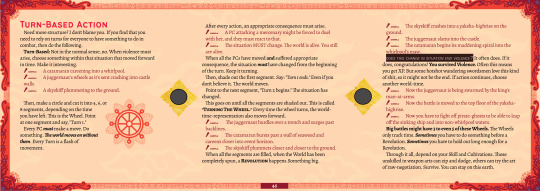
For SUNDANG RPG, I wanted to write a different kind of turn-based system. I stand on the shoulders of giants: PbtA’s Conversation-As-Procedure and “No Combat Minigame.” My goal was to make a battle system that had the free flowing, no-minigame feel of a PbtA/FitD game, but had a bit more structure to satisfy the action-heads.
One of the bigger inspirations for revolutionizing the turn-system is my obsession with The Raid: Redemption and The Raid 2, two seminal Silat films that have some of the best action sequences and choreographies in all of cinema. To me, it stands among Police Story 2 and Crouching Tiger, Hidden Dragon as the current peak of cinematic action.
A few things to lay down to help center the thought-processes I had:
I am of a theater-academic background. My fascination and hyperfixation on RPGs stems wholly from the Role-Playing aspect. My friend group loves to extract stories and narratives from gameplay loops, but we want to Role-Play In A World first and foremost.
Therefore, I value the Role-Playing Experience above everything else. This is no doubt colored and informed by what RPGs I began with: Vampire: The Masquerade and Mage: the Ascension. RPGs are world-portals to me, ways to experience, interact, and interrogate realities.
I don’t consider Mechanics to be separate from the “Fiction”. I might even deem a game’s rules to be the “Infrafiction,” the Fiction underneath everything else that arises from a game. The Fiction that demands to be told. The specter that suffuses every rules interaction.
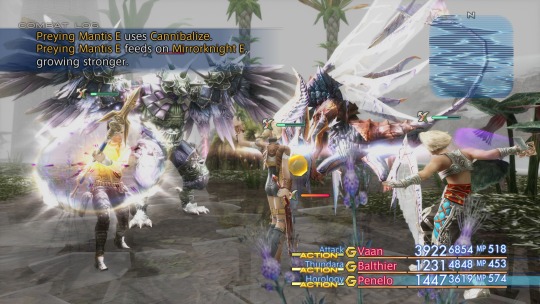
Tangent: This idea was first spurred on because of idle daydreams while playing and finishing my current run of Final Fantasy XII. For those that don’t know, Final Fantasy XII has the ADB or Active Dimension Battle System (which is funny because ADB is also the acronym for Asia Development Bank, one of the major enemies of National Industrialization in the Philippines). ADB is the evolution of the popular ATB battle system or the Active Time Battle System. It’s called ADB because you aren’t squared off into a different screen when you enter combat. Instead, you go into combat as you’re exploring the world. Combat and Dungeon segregation barriers are effectively destroyed. This is actually one of the reasons why I love FFXII so much, and so much of what FFXII worked is what I also love from its CRPG contemporaries such as Star Wars: The Knights of the Old Republic and Dragon Age: Origins. (It’s also very similar to the Combat System found in Xenoblade!)
So for SUNDANG, I had the following goals for combat and turn “order”:
Non-Minigame Combat, or Nondivided Combat Mechanics from the rest of the world/Conversation, taking inspiration from ADB.
No “Turns” just continuous “Action.”
Never-Not-Your-Turn vibe.
Skill-Based Combat.
Brutal, dangerous combat. Skull-cracking, bone-twisting, blood-drawing. Thrilling in the sense that a Horror movie is. A horror movie with wuxia protagonists.
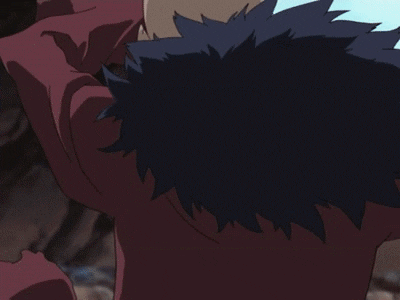
The Action
Action Economy is when, on your turn, you have a number of “Actions” that you can do, and you cannot do anything beyond the number of actions (of course you can do anything which you can justify as an action). This will define not just how your character moves in combat, but how they think of themselves throughout their progression. The most common form of Action Economy is “Move + Action” as seen in most d20 games, especially D&D 5e.
One of the very first things that I’ve had to unattach myself from is the Action Economy. One thing I noticed while developing SUNDANG was that every aspect of the game mechanics felt like it had to justify itself within the Action Economy. This was problematic to me for 2 aspects:
It centered combat completely. Since Action Economy only really mattered in combat, every little trinket that I had to write suddenly had to have some sort of interaction that could be done when you pressed the “Interact” action during combat.
It required “mechanization.” One of the major ideas I had for SUNDANG was to provide a mechanical base that centered on the gamization of the “fluff” without the designer having had a hand in it. If something said “This is a mallet, useful for evening out dinks and repairing machineries” it should be able to be used for that without having to interact with a subsystem. Through this, we annihilate barriers between “fluff” and mechanics, creating a more “immersive” world-space that is more conducive to Role-Playing.
While nothing is wrong with something requiring mechanization, I want it to be as invisible as possible, hence why the mechanical base of SUNDANG is built for such an experience: at creating an immersive interactive world.
One of my problems with Action Economy is that combat becomes about Action Economy. This is a problem that you can see so deeply within some of my favorite games: Final Fantasy Tactics, Tactics Ogre, and Final Fantasy XII all have Speed Stats that are affected by Weight, etc. Since having more “turns” is infinitely valuable in a game about getting more chances to reduce an opponent’s HP to 0, Speed-generating strats dominated those games’ upper mechanical ceiling.
While I think that’s cool, it’s not what I wanted to do with SUNDANG. It makes strange mechanical repercussions, dominations of certain strategies and therefore a larger gap between what is used and what is not used. I don’t want to make a game where you have to “solve” it through buildcrafting. I wanted to make a game where you can express yourself in.
So, away with the Action Economy. What do you do on the turn now?
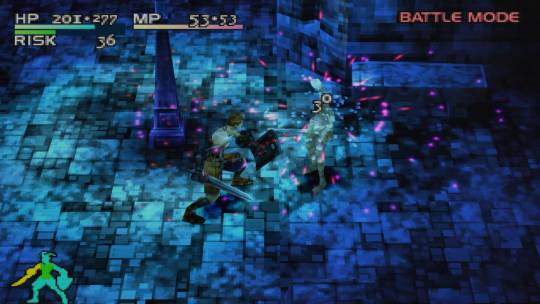
The Turn
“On your turn, you can do X and Y.” This is the basic assumption in most RPGs. In OSR and NSR games this is the common assumption as well. Move + Action is elegant, simple, and gets things moving along. It gets the system out of the way so people can keep focusing on the fiction.
More importantly, the Turn splits combat into every acting character within the current situation, context, or scene. Gives everyone a chance to act. Pins everything down into spacetime.
For SUNDANG, this was not the vibe I wanted to give off. It felt too spartan, in a way. I wanted people to be constantly moving, constantly turning. More importantly, as the RPG is a player-facing medium, I want there to be the vibe of “never-not-your-turn.” This is a problem I face with much of my past RPGs and with other combat-heavy RPGs.
You take your turn and then you sit back and wait for your next one. If you’re invested in the game, you watch as the situation and gamestate changes. If not, you wait until someone calls you out and then you ask what has happened and what has changed. In all honesty, my position is that this is not a bad game design quirk. In fact, if you design around it, it could be a good quirk. Being able to do something while it’s not your turn helps a lot with Attention Deficiencies, for example.
But this isn’t something I wanted to do with SUNDANG. I wanted it to be Never-Not-Your-Turn.
So I stole a bit from Fire Emblem. There, in Fire Emblem, a “Turn” isn’t a single character’s turn to move, but rather, an advancement of the combat time-space. You often have objectives where you have to “Rout Enemy In 40 Turns” or something along those lines.
So I revolutionized how I thought about Turns. What if Turns weren’t each individual being’s turn, but an entire group of people’s turns? Now this is phase-based or side-based initiative, common (and good! I actually love side-based initiative) in OSR games. It’s very wargame-y and, honestly, conducive to strategy. But that’s not what I wanted to do here.
So I turned the Wheel again. What if Turns were chunks of time in a combat? What if turns were just Rounds? Often, the existence of a combat minigame is so that people can “zoom-in” into the action, because this is a matter of life or death! You can get killed here! Hence why we zoom in, stop time, focus on the details because the details means the difference between kill or be killed.
So I focused on that aspect.
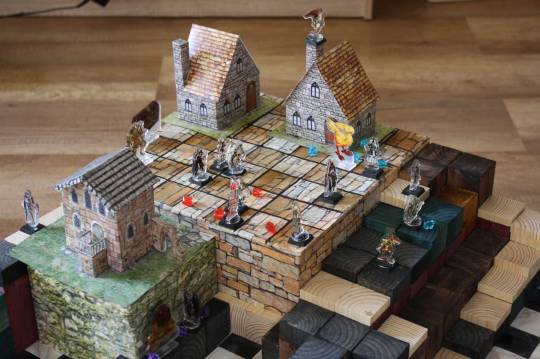
Turn The Wheel
In PbtA, one of the major schools of RPG Design that I profess to have arisen from, combat doesn’t have a “Turn System” or a “Combat System.” Instead, it flows naturally from the conversation. It is contiguous to the rest of the system, not requiring special attention. What you can do in normal roleplaying, you can do in combat! That’s what that meant. When you sequester combat away into a new set of rules, you implicitly change the game unless you explicitly design for it to be a microcosm of the game’s already existing rules. Due to this change, I believe the mindset then becomes that you have to play the game according to this new set of rules unless you’re particularly good at improv-ing or are some form of designer/GM yourself.
I wanted that. So SUNDANG’s “turn system” has no Action Economy, no Initiative, no Reaction (no Reactionaries!) When you want to do something, do it. But it will most likely require a roll, and it will change the state of the situation.Everything has an equal amount of appropriate consequences. This is already how PbtA “combat” goes, since it’s not separate from the Conversation, the combat is also a conversation. You do something, the world does something, you react to that, then the world reacts to that, and so on.
I therefore fused the “Turns as divisions of action space-time” and “Combat-as-Conversation.”
A lot of this clicked after listening to a Robert Kurvitz interview about how he wanted to do Skill-Based Combat Scenes. Which aligned with what I wanted to do. Check it out!
For arguments of space, such as movement rates, the normal movement rate is 5 tails (roughly, 25 feet) per second. One can then infer how much a character can move in a single Turn through that as well as the modifying, environmental factors (harsh terrain, labyrinths, and so on). This allows it to be played on a Grid with the Grid as a space-representer, with shifting distance-scales for each grid square. The more interesting consequence is that, when you move, what about the world that's actively trying against you? That will then necessitate a Check, making even movement volatile and situation-changing.

Turn-Based Combat: Never-Not-Your-Turn
First off the bat, this conception of Turn-Based Combat arises also from Clocks and Skill Challenges. The difference is largely the Presentation, mentality, and structure.
Additionally, SUNDANG’s Skill System is integral to this conception of combat. SUNDANG is a 24-Skill System inspired by the likes of Artesia: Adventures in the Known World and Runequest, where the majority of the Skills are not even combat-focused Skills, which color a player’s expectations for how combat could go (why be chained to the 3-4 Combat Skills when you can potentially agitate your Creativity to try and use the rest of them?)
So in SUNDANG, Turn-Based Combat is as follows:
If you enter into a situation wherein life-or-death is in the details, set up a 4-, 6-, or 8-segmented circle, known as The Wheel. Segment it according to the time you have left.
Find something within the world to be the temporal anchor, the World-Time. It could be the moving train, the skyskiff (that you might or might not be on at that moment!) plummeting into city streets, the wheels of a horse-carriage heading into a crash, the juggernaut battering ram barreling through enemy trenches. You can use this to lengthen the timescale of a battle. A day-long duel between two masters might have the Sun as their World-Time.
Turn 1 begins when you point at one segment and say it does. During a Turn, all the relevant PCs must do something.When they do something, the world then does something back. As always, this is just the conversation. When a PC goes and swordstrikes a pirate captain, the pirate captain will probably swordstrike back (dealing damage if that’s the PC’s consequence or threatening damage if not). Keep the conversation going.
When all the PCs have done something, mark out that segment of the Wheel. Turn to the next one adjacent to it, and say “Turn 2.” This is called Turning The Wheel. When you Turn The Wheel, before the PCs do anything, describe how the temporal anchor moves forward in time, and ascertain the consequences of that happening:
The skyskiff breaks through the high-rises. (Now there are potential people watching, now there are potential casualties, and so on.)
The horse carriage bumps against a tree and barrels closer to the cliff. (The carriage might have chunks broken off, some combatants might be knocked off, and so on.)
The Sun begins to sink into the horizon. (Dark becomes to impair vision, a nocturnal sea predator might breach soon, and so on.)
The juggernaut battering ram flies over enemy heads and moves closer to the city walls (there might be some warriors firing projectiles at you now, and so on.)
Finally, when all the segments are filled, a Revolution happens. Something Big. Throw away that Wheel. The situation changes. It has to. That’s the only real thing in this world.
The skyskiff crashes into the city plaza.
The horse carriage flies off the cliff.
The Sun sinks completely into the sea, ushering darkness.
The battering ram slams into the city walls and breaks it open.
Often, this change in situation ends Violence. You have to deal with the consequences now. In SUNDANG, you get XP for surviving Violence, not winning it. But SUNDANG is also a wuxia-western-silat game of wandering justicemakers and hotshot swordsmen. If this happens, set up another Wheel and choose another world-time.
You somehow survive the crash, and now must fight in the city plaza amongst hundreds of watchers.
The horse carriage plummets into a jade jungle, and you must fight upon its descending carcass.
The Moon rises now, as the fight continues on.
The King’s Man-At-Arms now charge toward the juggernaut to swarm and destroy it, with you still inside it.
The Violence continues. Deal with the consequences of your actions. Look forward to another Revolution.
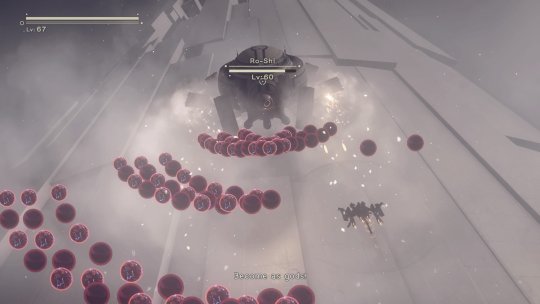
If this piqued your interest, SUNDANG is currently out on my Patreon and I'm running pseudo-playtests of it on the Patreon Discord!
33 notes
·
View notes
Text
SPOILERS FOR "APOLOGY TOUR!!!"
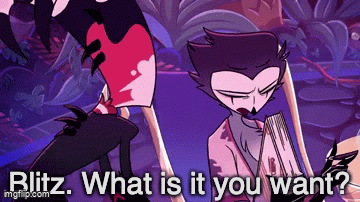
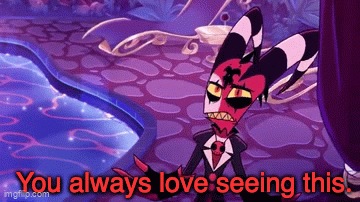
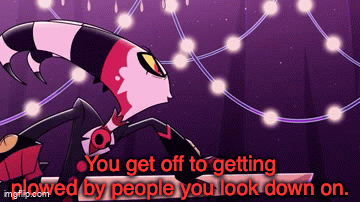
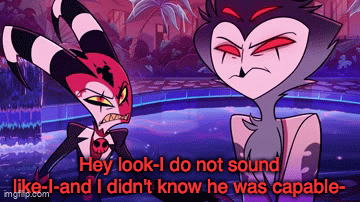
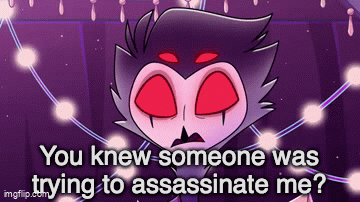
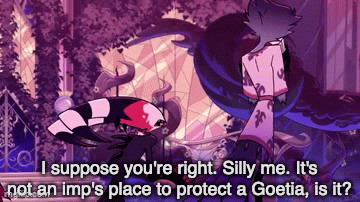
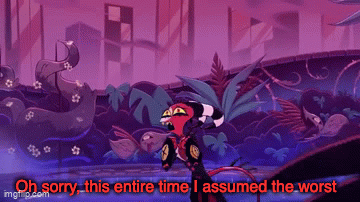
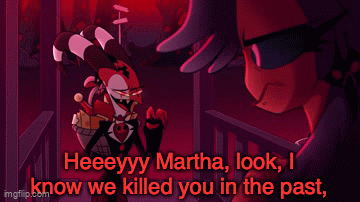
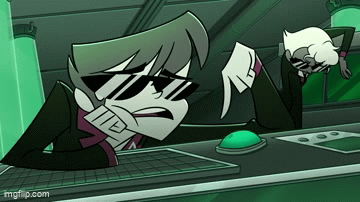
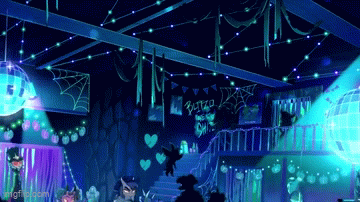
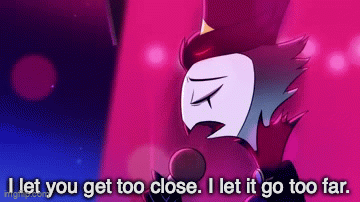
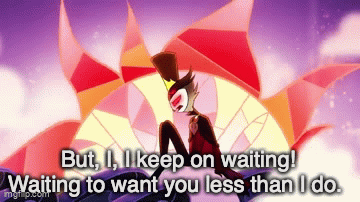
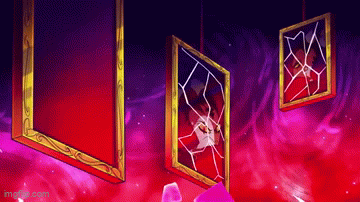
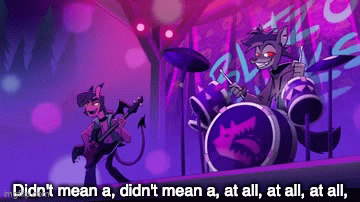
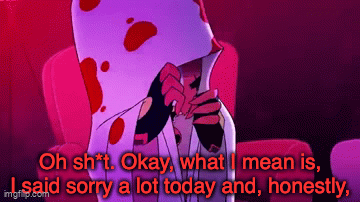
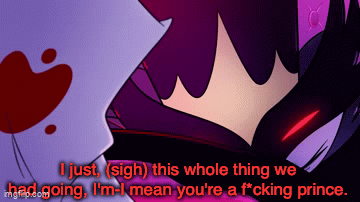
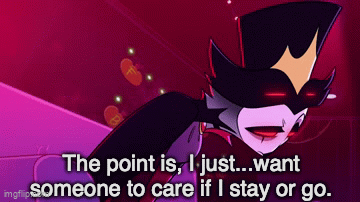
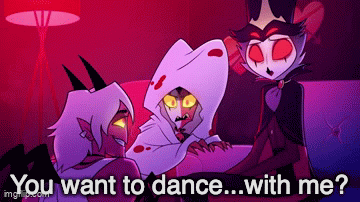
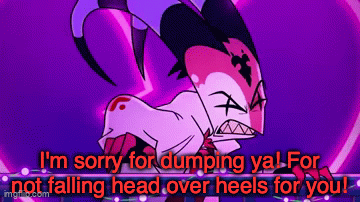
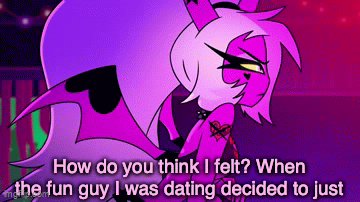
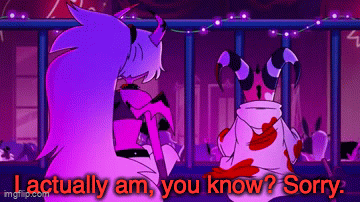
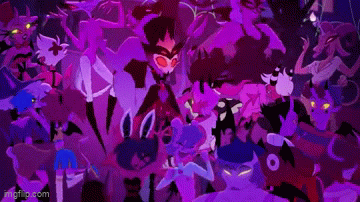
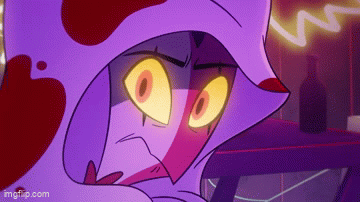
Oh this episode hurt, especially the ending. ;_; ;_; ;_;
I figured Stolas and Blitz wouldn't be back to normal or even amicable and that Blitz would need to learn about how his past actions when it comes to relationships have hurt people, but it's just so sad to watch the consequences some to fruition. ;_; Stolas holding onto his anger and hurt from what Blitz yelled at him as well as likely still blaming himself for the arrangement is justifiable since it's barely been any time since "The Full Moon," but him still not taking Blitz point of view on the matter and realizing where he messed up too didn't aid in their progress towards coming back together; Blitz playing up that he wants to just keep things sexual between him and Stolas while mocking relationships and refusing to admit that he did any wrongdoing only exacerbated the matter. :/ I didn't expect the Striker secret to come out and I don't blame Stolas for being upset about that. :/ It's too bad Blitz ruined his apology with a f*ck you and taking his lack of apologizing as a challenge rather than an actual call to change, but I did love the little mentioning of Fizz. ;)
The apology tour Blitz did was hilarious and I love that he actually was thinking about texting Stolas an apology, but of course, he didn't since it's the one he genuinely feels bad about; the surprise cameo of Martha and Mrs. Mayberry was probably the most shocking and hilarious! XD At the party, it was crazy that Blitz had been with and hurt that many people (and that's just the ones that attended O_O), and while I'm glad Stolas got out of the palace and seemed to be enjoy Verosika's company for the most part, seeing him continually drink was heartbreaking, especially because we know he's done it before. ;_;
"All 2 U" was an amazing song with Stolas just laying out all his feelings and pain with him even seeing how his past actions were wrong/contributed to Blitz not reciprocating his feelings. It was also practically unbelievable to see just how much Blitz actually took Stolas's words to heart and legit felt terrible. I love that Blitz showed concern too for Stolas being drunk (likely thinking about Verosika getting to that point and seeing the parallels) as well as him admitting his insecurity about no one being capable of loving him; Stolas then drunkenly pointing out that them throwing a party about how much they hate him every year showed they did care enough about him at one time was funny and true. XD I definitely teared up at Stolas's confession of just being wanting to be wanted and that he didn't even need the grand show he laid out to Blitz initially; the fact that Blitz did attempt to offer comfort to Stolas before he snapped back up made me go awww so hard. ;_; ;_; ;_;
Even though Verosika had such vitriol for most of the night, the fact that she uses the parties to bring those Blitz hurt some comfort that they aren't alone and can even find someone new from those he rejected is in a way comforting; it's sad though that she got dumped for just saying she loved Blitz. ;_; I'm glad Blitz admitted he has been terrible to people and that he wants to change, which definitely made it surprising that the line from the trailer was said to Verosika and not Stolas, but the impact was still great. :)
My heart broke at that incubus asking Stolas to dance because it gave me a bad feeling and sure enough, him and Stolas kissing hurt so much even though I know Blitz and Stolas aren't together anymore right now and this is part of the consequences for Blitz's actions. Him not ruining Stolas's fun hurt as well as at the same time showed he wasn't being selfish, so progress and pain. ;_; ;_; ;_; Hopefully it'll just be a one-night stand, but who knows since Stolas does seem to still want Blitz, but having a break may help both of them work on themselves. ;_; ;_; ;_; Well, if the shorts don't add anymore to the main story, here's me looking forward to "Ghostf*ckers" in October to find out how these two will handling things/change hopefully for the better next time. <3
#blitz#blitz helluva boss#helluva boss blitz#helluva blitz#stolitz#stolas#stolas helluva boss#helluva stolas#helluva boss stolas#verosika mayday#verosika helluva boss#helluva verosika#helluva boss verosika#apology tour#apology tour spoilers#spoilers#helluva boss spoilers#helluva boss apology tour#gifs#gif set#<3<3<3<3<3<3<3<3<3#helluva boss#vivziepop#ugh my heart#;_;#helluva boss martha#helluva boss mayberry#vortex#vortex helluva boss#helluva vortex
115 notes
·
View notes
Text
Adar the All Father
I’m still mourning the death of Adar, our All Father, maybe the most beautiful character in Rings of Power so far.
When we first meet Adar, we are introduced not to a dark lord or powerful general. We are introduced to a grieving father who loves his children. When we lose Adar, we lose not a dark lord or general. We lose a grieving father who would have risked everything to protect his children – even sacrifice them to escape enslavement.
Before Rings of Power, I never thought I would cry at the loss of an Uruk or even consider the tragic nature of the Uruk race. Even now, after watching the first two seasons of Rings of Power it is hard for me to think of Adar and the Uruks as villains. Yes, they did terrible things to the Southlanders and attacking Eregion wasn’t great, but they were not the actions of villains. They were the actions of a desperate father and his children who wanted to find a safe home. One of the greatest tragedies of season 2 (and maybe all of Middle-Earth in the Rings of Power universe) is that the Elves would never seriously work alongside Adar in destroying Sauron. For most Elves, Adar and the Uruks were synonymous with Sauron and Morgoth and Adar knew better than to expect any kindness from them (despite reaching to Arondir, Galadriel, and Elrond during both seasons).
Joseph Mawle, the actor who played Adar in season one, must receive the most credit for creating the Adar we know and love. Mawle created the mystique, the internal pain, the despairing love for his children, the hopeless desire for peace, and the unwanted, but familiar ruthlessness to achieve his goals. When we first meet Adar, we learn first about his love for his children, his bittersweet memories of his Elven life, and his unstoppable commitment to provide his children with a home. His conversation with Arondir is soft and sad and mesmerizing, intriguing us all with this strange introduction of one of the first Uruks. He is not the mindless, cruel animal we are used to. This father of the Uruks knows love, knows sacrifice, and knows how to yearn for peace.
His children trust him unquestionably because he gives them a vision and the hope for a future where they can live and exist without fear or pain. He tells them they are loved and deserve life as much as any other race. They are not animals destined for extermination. They are people and they will claim a homeland for themselves, damn all who dare stand in their way.
Mawle’s Adar gives his Uruks a dignity that was missing from any of the previous LOTR related adaptions and is one of the reasons he became a fan favorite. One of Tolkien’s core tenets in LOTRs is the power of mercy and pity and giving people the choice to do the right thing, even when previously they’ve only caused harm and pain. We want Adar and his children to find a home. We want Adar and his children to escape Sauron’s clutches. But we also don’t want the Southlanders to lose their home.
The battle between the Southlanders and the Uruks is supposed to serve as proof that Adar is still a servant of Morgoth. He does not plan to share this land with anyone. He does not approve the Southlanders with any sort of deal or compromise. He invites and he kills and he decimates the land so only Uruks can call it home. Many of our heroes are caught in his rampage and are endangered or wounded by his actions. Yet, is the destruction of the Southlands the act of a villain or it is more of a Magneto-esque act of liberation based on the knowledge that no one would ever willingly accept Adar and his children? Adar does not attempt the peaceful methods because no one ever used peaceful methods with Uruks. It is a lost cause because of the prejudices and racism of Middle-Earth. Why should he care for those who would kill his children as first sight? Mawle’s Adar is not interested in justifying his actions. Instead, he turns the mirror on the heroes of our story and reveals they are just as violent and bloodthirsty as Morgoth, especially our main heroine Galadriel. Is she someone he can find a compromise with? Is Waldreg, who really wants to serve Sauron, Adar’s prime enemy? The Elven commanders of the Watch?
No, there is no one willing to treat with Uruks and so the Uruks will do what they do best and claim the land that has been overrun by their enemies.
Mawle’s Adar suffered under Morgoth and it is a pain he cares for the rest of his life. Unlike most characters who have undergone extreme torture, the pain is represented by a scar or “flashbacks”, but Mawle’s Adar walks as if his entire body is in pain all the time. His movements are stiff and calculated, as if every movement sets his nerves on fire. He bears himself with the angry pride of someone who has never been welcomed anywhere, but he is worth as much respect as the High King in Lindon damn it!
Finally Mawle’s Adar is queer because he subverts many expectations one would have from a male character, whether he be a hero or a villain. He is soft spoken, gentle with his prisoners, loving with his children, and cries when they die. His acceptance of his Urukness when all others think it’s wrong. His demand for a place for his children when all others think they are disgusting animals. His refusal to accept definitions placed upon him and his children by others. His celebration in what others deem to be macabre or disgusting. He also has chemistry with every character he interacts with (no matter their gender)
In season 2, Adar is played by Sam Hazeldine who does a fantastic job add layers of complication to Adar’s character while still referencing the core components defined by Mawle. The first episode of season two starts with Sauron (played by Jack Lowden) selling himself as Morgoth’s successor to a gathering of Uruks. Adar is there and it’s clear Sauron thinks Adar is on his side. However, Adar betrays Sauron and he and his children “kill” Sauron. In this episode, we see the same pain, the same weariness, and the same love for his children that Mawle portrayed, but we also see Hazeldine’s addition of deep-seated rage for Sauron, rage over his own fate now that Morgoth is gone.
When we see Adar in the present, he is sitting on his throne, with his big sword, surrounded by Uruks, and he is powerful. His presence has changed from the almost elemental spirit like quality Mawle personified to a stronger, more present, more dangerous presence. It’s almost as if now that he has achieved his goal of a homeland, he is on edge, waiting for it to be taken away. This Adar is still in constant pain, still queer as hell, but more determined and leans into his old role as a ruthless general/warrior.
When he finds out Sauron is alive, we see Adar response to a severe trauma trigger that clouds all thoughts of peace and compassion. Similar to Galadriel’s reaction to Sauron in the finale, Adar cannot live in a world where Sauron still exists. He is not safe. He has too much anger to ignore. He has scores to settle. He has children to protect. He cannot wait in Mordor for Sauron to play everyone else for fools. He knows Sauron will come for him and his children. It is better to hit him now when he is weakest. And so he gathers his children and his marches to war once more – despite the misgivings and doubts of a handful of Uruks.
Once Adar discovers Sauron has made Eregion his home, Adar writes off the entire city and its people. Similar to the fate of the Southlanders, Adar doesn’t care what happens to those who stand between him and his goal. He will destroy the tormenter of his children, even if he has to destroy the most beautiful city of all Elvendom. When he reunites with Galadriel, we see that Adar can be as manipulative and cruel as Sauron. He plays her like a fiddle to get all the information he needs and then he uses her to trap Elrond into his own morality conundrum. While he is still gentle and charming when dealing with both Galadriel and Elrond (flirting with both of them the entire time. Seriously, he calls Elrond beautiful and stares at Galadriel with heart eyes as she threatens him as knife point), they are just tools to use against his real enemy Sauron. His drive to destroy Sauron taints even his love for his children. He sends them wave after wave against Eregion’s defenses, watching them die in the hundreds and sends in Damrod, a troll who kills just anyone and anything in his way – Uruk and Elf alike.
In one of the most heartbreaking moments in the show, after a particularly costly charge, Glug, one of his children, says “Father, you said you love us.”
Adar turns and replies, “With all that is left of my heart. Too much to let you be slaves to Sauron.” In his moment of fear and trauma and pain, he can only see the extremes: either his children are enslaved by Sauron or they die but are at least free from Sauron’s control. He cries as he says goodbye to the dead and dying Uruk, forced to face the terrible price they must pay to be safe. Galadriel sees his tears and, maybe, in that moment she understands who her true enemy is: Sauron, not the victims of Sauron and Morgoth’s cruelty.
Sam’s Adar is the battered spouse who desperately tried to escape their abusive partner and instead learns that the world doesn’t care about the plight of the abused. The world will cast you back to your abuser because “that’s where you belong.”
In the finale, Adar, wearing Neya, Galadriel’s ring, reverts to the man he was before Morgoth. An Elf with a “meaningless name. A name given to him” Adar is the name he earned and one he wants to keep. Nenya, whose power in the show is to heal and provide visions, gives Adar the first true hint of hope he has had since before Morgoth. He realizes his rage and his trauma turned him into Sauron’s puppet, as Sauron intended, and he realizes he’s lost the trust of his children, but even in the midst of all that darkness there is still hope. Nenya represents hope. Galadriel, who tells Adar that if he helps her defeat Sauron, there will be a place for his children, represents hope. Even though she admits she has killed more of his children than any Elf alive, he forgives her.
“I forgive you. No more flames. No more darkness.” He tells her as he hands her the ring, “Let us heal Middle-earth and create a lasting peace between the Elves and the Uruks.”
After handing her the ring, he reverts to his true form, Adar the Father of the Uruks.
A wounded Glug is brought to him and he bends down, begging his son for forgiveness. Glug tells it’s too late and Adar replies, “It’s never too late. Not even for me. And not for you, my son.”
And Glug stabs him, followed by several other Uruks. Sauron appears and watches with smug satisfaction as Adar is killed by his own beloved children. Even in death, Adar is only considered about his children, calling out to them in Black Speech, but it’s not enough. He may have found peace within himself and with Galadriel, but he couldn’t undo his betrayal of his own children.
In anger and trauma of his own, Glug saw his father as an enemy, as the wolf in sheep’s clothing, as someone who claimed to be different but was just as ruthless and terrible as Morgoth. In Sauron, he found someone who was kind and made grand promises and was the original creators of the Uruks. And so, Glug took his chance and doomed his entire race to enslavement.
Adar and the dream of a free Uruk race may have died in the finale, but Adar lives on in our hearts and as an inspiration for everyone struggling with their own darkness, their own strangeness, and a society that does not want them or respect them. I hope he also continues to live on in the hearts of the Uruk. They may, by and large be enslaved by Sauron, but I hope we see just how tenuous Sauron’s hold truly is. I hope we see small Uruk rebellions and whispered stories of Adar and Glug and their dreams of peace. I believe in the book, the Uruks complain about their lot and hate the fact that they have to answer to the Nine Wraith as well as Sauron. Maybe Sauron needed the Nine to keep order amongst the ranks of a disgruntled mass of Uruks who stubbornly preserve the memory and hope of a better world – someday. And maybe that is just one more dream Sauron tries to twist and corrupt to suit his own purposes, which is why the Uruks never truly break away from him. But I hope we see that internal struggle through the remaining seasons. And I hope, we as a fandom, can imagine a Middle-Earth after Sauron’s fall, where Aragorn, Eomer, and their descendants learn from the mistakes of the past and finally see the Uruks as Morgoth’s and Sauron’s victims and Adar’s children can finally know peace.
Thank you Joseph Mawle, Same Hazeldine, JD Payne, and Patrick McKay for brings such a beautiful and inspiring character to life.
#the rings of power season 2 spoilers#rings of power spoilers#the rings of power#rings of power#trop spoilers#trop season 2#sam hazeldine#joseph mawle#adar#I love you adar now and forever
41 notes
·
View notes
Note
Do you know why Obito's actions get so much hype? I'm genuinely confused cause fans keep complimenting up his complex personality and philosophy but what exactly were his achievements??? Why was he right? What was he right about?? Why is he so amazing? I'm in pure confusion cause did I miss something good that he did? Did he help the world in some way that I didn't notice?? Did he say something that was really worth the hype? Geniunely asking I swear I really don't get the Obito glaze
I wrote about Obito here.
I have said it before as well that Obito doesn't make any sense to me, because his trauma neither excuses nor justifies the shit he pulled for years, killing countless people, manipulating them, and using them, and then throwing them away after they were no longer of any use to him. That's what he planned to do with Sasuke too.
Sure, he was manipulated as a kid and lost the most important person to death, and he felt Kakashi was responsible for the death. But he knew Kakashi wasn't responsible. He knew Kakashi couldn't do anything for Rin no matter what he wanted. And she actually made a sacrifice for the innocent people who would have died because of her.
Obito disrespects Rin as well.
There are two kind of people who praise him. And they're both idiotic.
1. Those who think he was against the system and wanted to change it.
2. He started the war because of the person he loved, hence justifying the oversimplified phrase "a hero will sacrifice you to save the world but a villain will sacrifice the world for you."
Both are complete bullshit.
Obito didn't want to change the system. He made it worse. Most of the major tragic incidents that the characters went through had something to do with Obito. He directly participated in them.
From Minato and Kushina's deaths to the Akatsuki becoming evil and Itachi and Sasuke's lives being ruined forever, it was ALL Obito's doing. Then the Uchiha massacre and the war, too, of course.
He was trying to change the system? After making it worse on his own?
Then the hopeless romantics who keep searching for the Shakespearean tragedy in him and how he chose love over the world, which is as dumb as it can get.
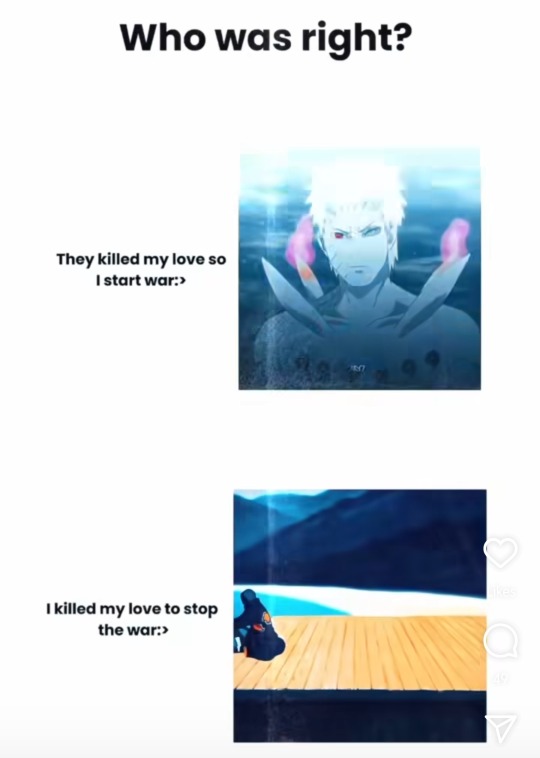
The clownery goes on further when he's compared with Itachi for this stupid reason. So many things wrong there. Apart from Itachi having no lover, Obito too didn't start the war because of Rin. Nobody killed Rin, but she herself, and he knew why. But of course, he needs to be defended and justified because it makes some idiots feel good about themselves.
I personally like his faux Madara personality because it was badass. And I like writing him that way (only his interactions with Sasuke though). But other than that, I don't find him all that appealing. For a long, long time I had no idea why everyone was praising him. After Itachi's death I keep forgetting the parts that aren't about Sasuke. And Obito had nothing to do with Sasuke post Itachi's death.
So, the unmasked Obito is uninteresting to me as a character. I don't find his story tragic either. The characters like Pain have much more depth and their motivations are understandable too. They were victims as well.
While Obito was a victim as well, especially of war and Madara's manipulation, he never implements his experiences to make things better. He makes them worse. He chooses to do evil willingly. There's a hint in the chapter #476-478 that he worked with Danzo as well during the massacre. He had power of a leader and instead of doing anything for the better he manipulated and plotted the war.
To me, there's very little that I like about him. I can't sympathize with him either. He did far, far worse things to his victims than what was done to him, if you look at Naruto, Sasuke, and Itachi (who are actually his worse victims).
17 notes
·
View notes
Text
January 31, UC 0079
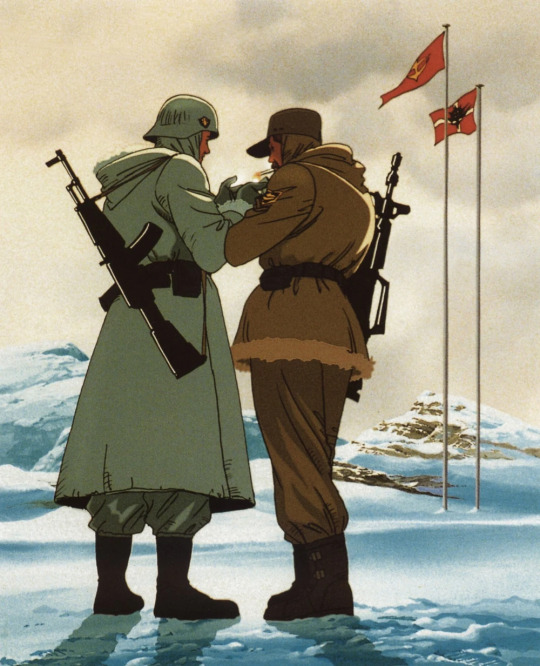
Beleaguered after a month of devastating losses, the Federation agrees to meet with a delegation from Zeon to discuss surrender.
Revil, who was able to see the true state of the Zeon homeland after his capture at Loum, is rescued by EFF agents in time to deliver a speech that will rouse the Federation into continuing the war:
youtube
Revil's intervention results in the Earth Federation and Principality of Zeon signing the Antarctic Treaty – banning the use of colony drops, nuclear weapons, and other means of mass destruction for the remainder of the conflict.
(A transcript of Revil's speech as presented in the above video can be found below the cut.)
"Fellow citizens of the Earth Federation, I speak to you now not only as General Revil, commander of our armed forces, but as Johann Abraham Revil, a survivor –like many of you here– of this horrible war. Despite the innumerable losses, despite the state our Federation is in, I appeal to you all: Zeon is exhausted! They have become low on ships, weapons, troops, even ammunition! Why, then, should we surrender to Zeon?
"Let us not forget the arrogance of Degwin Sodo Zabi, who had usurped power within Zeon, proclaiming the people of Zeon as 'the chosen people.' He justified the idea that we of Earth are bound by Earth's gravity, stuck in archaic ways of thinking, incapable of grasping the new changes of life – and because of this, Zeon has no right to listen to the Earth Federation. However, although Degwin Zabi may be wrong about us as a whole, I will admit to him that if there are any true evils within our Earth Federation, it is the weak-kneed, bureaucratic leaders of our government – unable to ever think for themselves, sinking into their own corruption.
"However, this does not excuse Degwin Zabi for attempting to start a dynasty of Zeon dictators! Even if we do the impossible and recognize the Principality of Zeon as a sovereign nation, we will never sink to our knees in surrender! The Earth Federation was founded on the ideals of individual rights, the crystallization of knowledge within Earth. If not for the Federation government, then mankind would never have even ventured into the starry heavens of outer space.
"But now, Degwin Zabi's son, Gihren Zabi, wishes to take his father's vision a step further: by saying the Federation is weak and backwards in its ways of thinking, Zeon has the right to slaughter everyone who stands in the way of progress! Does this excuse the death of four billion people? No! The Federation will not excuse his monstrous actions!
"And so, fellow citizens of the Earth Federation, will Gihren send Luna 2 into Earth? No! Does Zeon have the ability to make troops from nowhere? No! Does Zeon, despite these facts, have the capability of defeating the Earth Federation? No! Gihren is hoping that by bluffing and sleight of hand, coupled with the loss of four billion lives, that the Earth Federation will surrender to him. However, because of my good fortune, I've witnessed the truth, and I shall reiterate it: Zeon is exhausted!
"Now, more than ever, we mustn't falter to their demands! We must rise up, as one unified Earth Federation, and defeat Zeon! Long live the Earth Federation!"
#Gundam#Sunrise#Bandai#Universal Century#One Year War#January#Antarctic Treaty#Earth Federation#Johann Abraham Revil#Principality of Zeon#gundam calendar
23 notes
·
View notes
Text
Arcane and Character's Breaking Point.
One of the complaints I've seen floating around regarding season 2 of Arcane is that a lot of the characters act in a way they shouldn't. That acording to their characteristics they wouldn't react or do certain actions and they are instead dictated by the plot, and while I don't want to completly disregard that opinion, I think people are forgetting that the show wants you to see the characters as more than just archetypes and instead as real people.
And people have their breaking points, people never act the way they should in stressful situations, even if with the benefit of hindsight or a 3rd person perspective we can opine how they should have handled it, it's only because we are divorced from the moment, away from the emotions and conflicts.
Let's talk Vi. Vi is a great example of this because I'd say she has 3 breaking points.
If you were to describe Vi or look her up in a wiki one of the things you'd find out is that 'Vi is a protector, Vi cares for her family'. And that is factually true, above all else she fights for and to protect her loved ones, and the show highlights this repeatedly, to the point that it's very often detrimental to her. But she's more than just the words 'Protector' tattooed onto her forehead, she is a real human (in the story terms) and so, when pushed to her limit, she snaps, and interestingly in the three different ways.
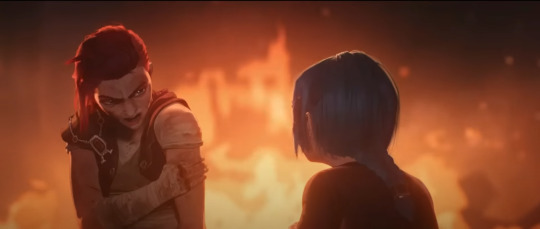
The most famous one is when she lashes out in anger at Powder, where 75% of her family had been accidentaly killed by the other 25%, and in that moment of just sheer anger pain she commits the worst mistake of her life, and inflicts that pain onto a loved one. Would Vi normally do this? No, absolutely not. But the situation is not normal. And the show points this out, as she regrets it almost inmediately and for the entire rest of the series, and likely much much later. Vi understands, as we understand, that she fucked up, that she failed to protect her family then.
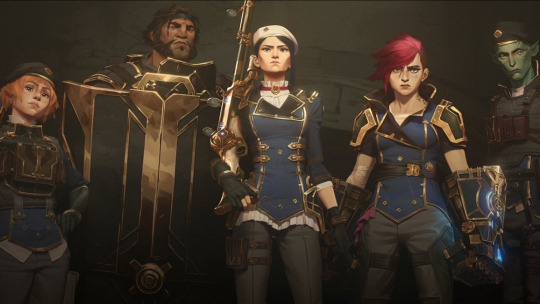
Then there's the second one, where after the attack on the council Vi puts on the enforcer uniform and goes to hunt Jinx. 'She'd never do that', yes she would, because Jinx pushed her away (like she did to her years ago), and in a moment of desperation Vi tries to find a new family in Caitlyn and justifies 'Jinx' as having killed Powder, and the only thing Vi cares about is protecting her family, even if it means doing something she hates, like putting an enforcer uniform and hunt her sister. Vi decides to hold back Caitlyn's worst decisions, and stop Jinx from ruining her sister's memory, she'll protect them from themselves, at the expense of her own desires.
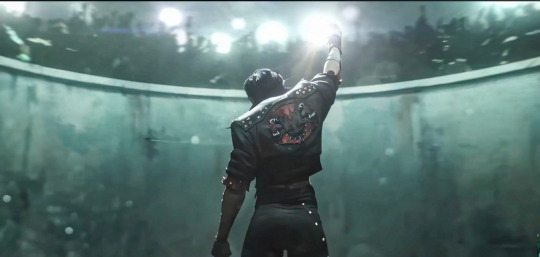
And the final breaking point is when Caitlyn pushes her away, and left with nothing and noone to protect, Vi enters a self-destructing cycle, despite the fact that technically she still has her family out there somewhere to protect. But she can't, she's been pushed to her limit and the protector can no longer find in herself the power to protect. So...she just fights, and drinks, and waits for either to kill her.
These are not out of character, this are completly in character, accepting that she's been strained to her limit in these cases.
And this happens a lot in Arcane:
Why does Caitlyn, who is kind and respects justice, enforce martial law?
Why does Jayce, who tends to let himself be influenced easily, become so focused in his own goal?
Why does Mel, who is so in control most of the time, act so confused and scared?
Why did Vander, who loves his family and friends, tried to drown Silco?
Why does Viktor, who intially put such high importance on human choice, eventually disregarded it?
Why does Ambessa , who puts such value in sacrifice, refuse to sacrifice her daughter?
There's even a point to be made that some characters are in a constant state of being pushed to their limits, compare how Jinx acts normally to her childhood as Powder, the alternative Powder, or hell even Jinx with Isha and away from Silco. Compare Silco from the flashback or alternative universe to the Silco we knew.
What I'm trying to say is that it's better to look at these characters as beyond just the small phrases to describe them normally, and instead try to see them as living breathing people, and ask yourself, would you in a situation where you've been pushed to your limits act as you normally do? Would you, for lack of a better term, 'Remain in character'?
(Thank you so much to @restrainedhungr who proof read and gave feedback to this, helping to iron out some of the points)
29 notes
·
View notes